

VOICE OF GUIDES
Complete travel guide to visit babylon/hillah in iraq.
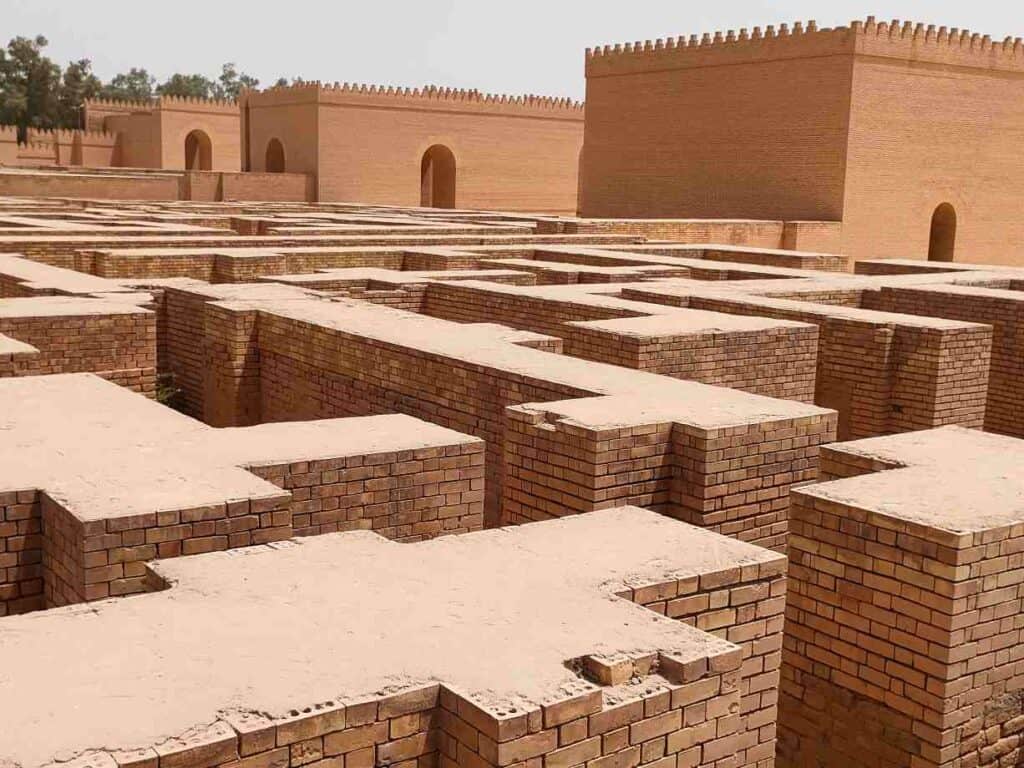
This article may contain affiliate / compensated links. For full information, please see our disclaimer here.
Visiting the ruins of Babylon is considered one of the top and most beautiful things to do in Iraq, which is part of every Iraqi travel itinerary. Thanks to the Tower of Babel, the Hanging gardens, and the Code of Law of Hammurabi, Babylon is the most reputed ancient city and the place where Alexander the Great died. However, from an archeological point of view, its modern reconstruction ruined Babylon, and there is hardly anything left of the ancient part. It is still a must-see, but there are plenty of other things to do around Hillah. This travel guide helps you visit Babylon and discover all the interesting heritage sites around Hillah.
The achievements of Babylon
- 5. Al Kifl- Ezekiel' tomb
3. The richest man in Babylon
Where is babylon and how to go there.
To visit Babylon, which lies along the famous Euphrates River, you first have to go to Hillah city, 120 km south of Baghdad . From Hillah, you can get a short ride (20 minutes) to reach the heritage site of Babylon.
From Babylon: If you only visit the Babylon ruins, you can easily do it on a day trip from Baghdad.
However, if you plan to visit other things around Babylon and continue your trip to Karbala and Najaf, you should stay for the night in Hillah. I recommend that you plan your Iraq itinerary this way, as making day trips from Baghdad can be time-consuming due to the horrific traffic in the capital.
Shared taxi from Baghdad to Hillah: 10 000 IQD
From Karbala or Najaf: If you are coming from the south, you can easily go to Hillah/Babylon from Karbala (46 km) or Najaf (65km).
Shared taxi from Karbala: 5000 IQD
Shared taxi from Najaf: 5000 IQD
Entrance fee to Babylon: 25 000 IQD (this is the regular price for almost all sites in Iraq for foreign travelers) + an extra 1500 IQD for Saddam’s Palace.
Important: you can only visit Babylon if you have a visa to Federal Iraq. The Iraqi Kurdish visa is not valid for other parts of Iraq, including Hillah/Babylon!
Read this article about all you need to know before traveling to Iraq.
Things to know before visiting Babylon
Babylon’s history is divided into two parts: Old Babylon (1894 – 1595 BC) and the Neo-Babylonian Empire (606–539 BC), when Babylon regained its role as the leading city in the world.
Many scientists consider the civilization of Babylon and other cities in this valley to be the oldest recorded, dating back 8000 years. Sadly, almost nothing has been left of ancient Babylon apart from earthen hills. Within a few hundred years, it was eventually abandoned, deserted, and absorbed by the desert earth.
Most of what you see was constructed by Saddam directly on top of the over 2000-year-old remains. From an archeologist point of view letting trucks and shovels to site was a disaster. Still, it is considered as one of the most beautiful places in Iraq.
Insurance: Safetywing is a cheap travel and medical insurance that also covers COVID-related issues in most countries, including Iraq.
Flights: Use Google Flights or Skyscanner to book your flight to get the best flight offers.
Old Babylon
Old Babylon’s story started with the Semitic nomads who moved with their herds to the area between the Tigris and Euphrates. They settled here and finally converted Babylon into a glorious city, conquering the rest of Mesopotamia. But the Babylonian rulers were not obsessed with violent and aggressive expansion policies. They were known for their wisdom and knowledge. Old Babylon’s story ended when it fell under Assyrian control. Without a doubt, Babylon is the ancient city the most engraved in our memories.
Hammurabi, who called himself King of the Amorites, was the 6th king of Old Babylon who transformed it into the leading city of Mesopotamia during his 43-year-long reign. He increased the height of Babylon’s famous walls and extended and beautified the temples. However, his most memorable achievement was the code of law, which was not the first, but the most extensive and clearly written, with almost 300 paragraphs. The law was inscribed on a column of four tons of black diorite stone and was excavated in Susa, the Elamite capital (in today’s Iran) that they looted during a war with Babylon.
Hammurabi’s code of law was advanced and fair in some respect and included harsh penalties at the same time. False accusations and testimony entailed the death penalty; however, it was generally murder, adultery, or other crimes that were punishable by execution. It covered family, slavery, administrative, agricultural and administrative law and was based on the eye for an eye principle.
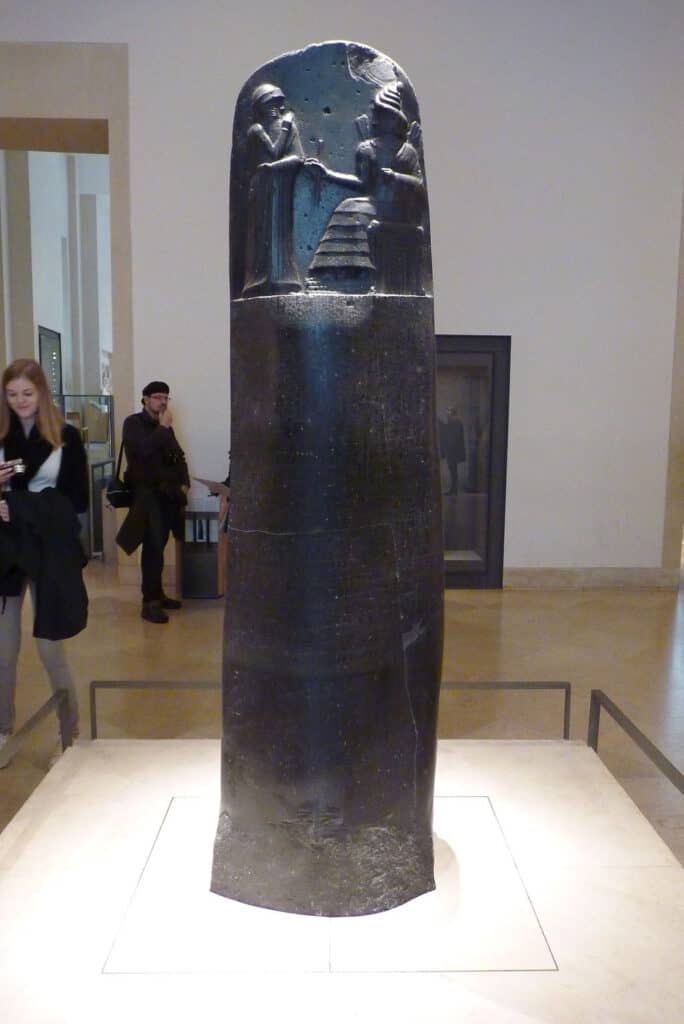
Babylonians were extremely Godfearing. They believed if they neglected the idols of the Gods and failed to do the proper rituals, or if the statue got stolen, as it happened many times, it would attract catastrophe like drought, disease, or military disaster, and misfortune to the people of Babylon.
Religion and government were closely intertwined in the Empire.
Nebuchadnezzar II also built Babylon’s Hanging Gardens to please his wife, Amytis, who missed the mountains of her Iranian homeland. It has terraced sides appearing as steps up to heaven. The Hanging Gardens were one of the seven wonders of the ancient world.
The most precious inner parts included the private palaces of Nebuchadnezzar, the processional way surrounded by immense walls covered with blue-glazed tiles featuring golden mosaics of lions, bulls, and dragons and leading to the Temple of Marduk from the 18-meter-high Ishtar Gate.
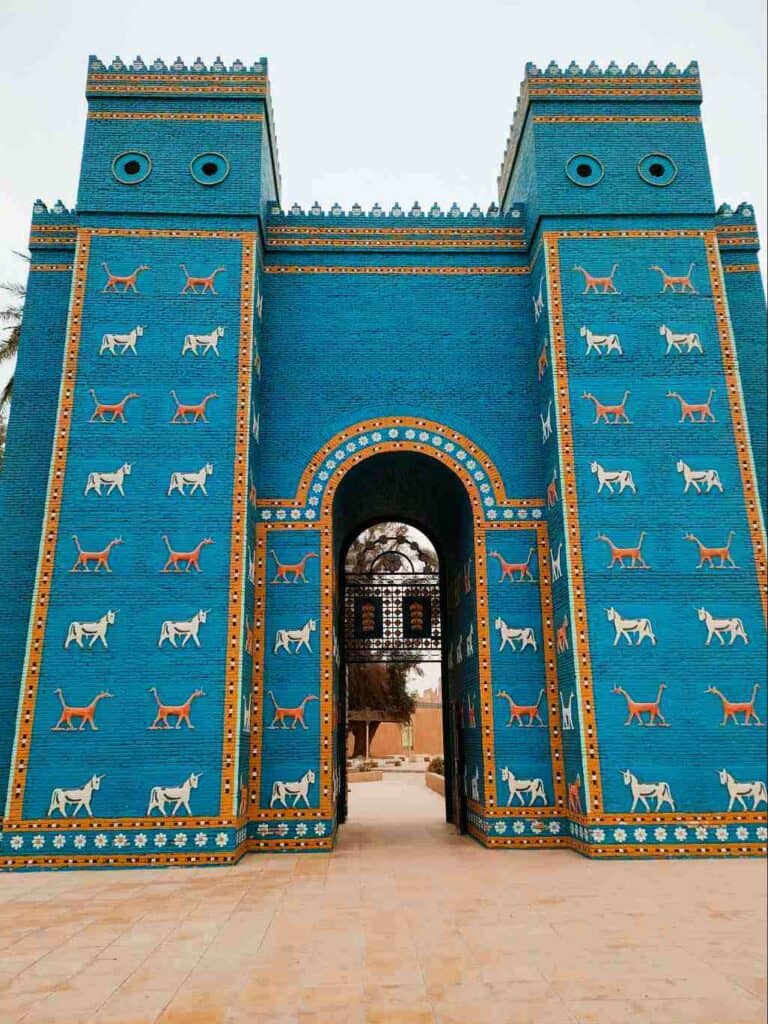
The Babylonians studied the earth’s rotation using mathematical models, predicted lunar and solar eclipses and the movement of planets. They achieved incredible results in mathematics and knew how to measure the diameter and circumference of a circle and calculated pi (π) to a value of 3.125. Babylon hosted one of the world’s first known libraries.
The description of the Greek historian Herodotus is the only one available to us about Babylon at its peak, although he was born 50 years after. He talks about the incredible fertility of the region and describes Babylon as a breathtaking city with such wide walls that chariots could ride around.
A Babylonian pharmacy inventoried about five hundred medicines around 1000 BCE. There were no hospitals, but doctors treated patients in smaller clinics, with beds for those requiring overnight care and surgeries.
Babylon as a list was lost, but not its wisdom, which was preserved on clay tablets baked into a solid tile. These tablets gave us insight into local life, laws, royal decrees, and even poetry. Archeologists recovered hundreds of thousands of them.
Saddam’s palace overlooking Babylon
On top of the hill next to Babylon stands one of Saddam’s many residences, overlooking the ancient ruins. He built the palace in 1991 during a severe economic embargo imposed on Iraq after the Gulf War. A winding ramp leads up to the palace that recalls the pyramid shape of ancient Sumerian ziggurats.
It was the headquarter of US troops between 2003 and 2011 during the invasion after the Second Gulf War. These palaces were not open to the public, and an average Iraqi person had no idea about the megalomanic lifestyle Saddam lived inside. Over 100 palaces scattered around Iraq, some of them he only used once or twice. For security reasons, he never disclosed where he would sleep the day after, and more palaces prepared for his arrival. Most palaces were damaged and looted during the wars, like this one in Babylon, and never renewed.
Despite graffiti covering most parts of the palace, the marble columns and the ceiling frescos give an idea of the luxury the president enjoyed here. Don’t forget to include it in your program when you visit Babylon.
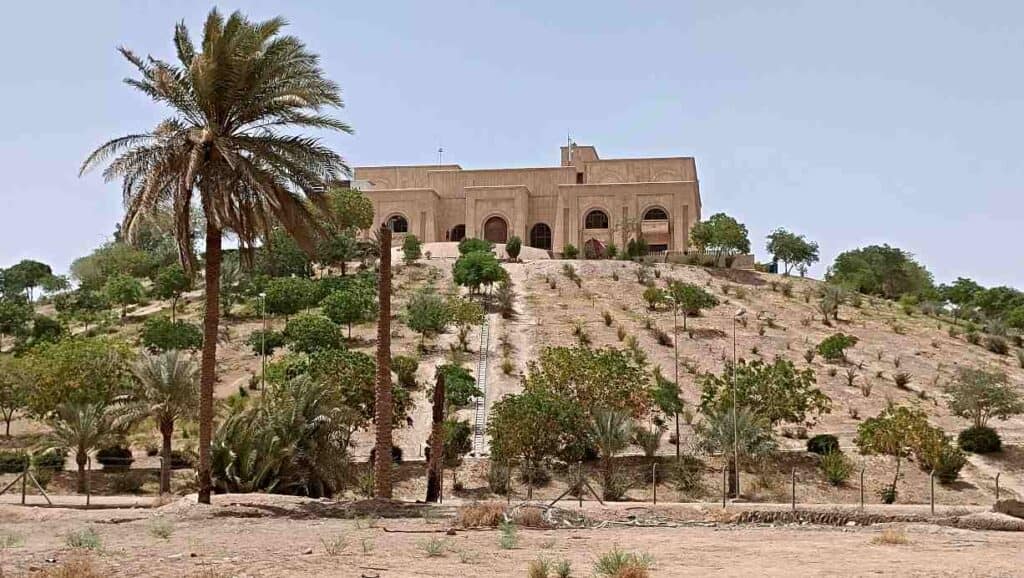
2. History, Enthralling. The Babylonian Empire

Here is a list about other recommended books about Iraq
I hope you found this travel guide about visiting Babylon useful. Despite mainly being the result of Saddam’s reconstruction. It is one of the best places in Iraq, and you must include it in your Iraq itinerary. You can visit it on a day trip from Baghdad or Karbala and Najaf. However, you should stay overnight in Hillah if you also want to see other things near Babylon, like Borsippa, the tomb of Ezekiel in Al-Kifl, or the tomb of Ibrahim.
Other articles about Ira q
All you need to know before traveling to Iraq
How to visit Mosul in 2022?
Travel guide to Basra
What to visit in Baghdad in 3-4 days
The best books to read about Iraq (constantly updated)
Visiting Lalish, the holy place of Yezidi people
More articles about the Middle East
10-day itinerary to visit Lebanon
How to spend 2-3 days in Beirut
Travel guide to Tripoli, Lebanon
Best books to read about Lebanon
Alternative tours in Beirut
Traveling around Lebanon during the economic crisis
What you can and cannot do in Iran
45 things you must know before traveling to Iran
The best books to read about Iran
The best 2-week itinerary in Iran (the classical route)
North Iran: 2 week itinerary
All you need to know about the Iranian currency
The best places to visit in Tehran (museums, palaces, religious sites)
The best things to do in Tehran
Travel guide to Isfahan
Travel guide to Shiraz
Travel guide to Qom
Travel guide to Kashan
Travel guide to Yazd
Travel guide to Tabriz, North Iran
Travel guide to Mashhad, the holy city of Iran
Best things to do in Lahijan, the city of tea in Iran
Best things to do in Ramsar at the Caspian Sea
Visit Varzaneh desert, Toudeshk, Mesr desert and Garmeh from Isfahan
Best books about Jordan
The perfect Petra one and two-day itinerary in Petra
Visiting Jerash, Ajloun and Umm Qais
Jordan desert castles: a day trip from Amman
How to spend one day in Amman
5, 7 and 10 day Jordan travel itineraries
All you need to know before planning a trip to Jordan
Pin it for later!
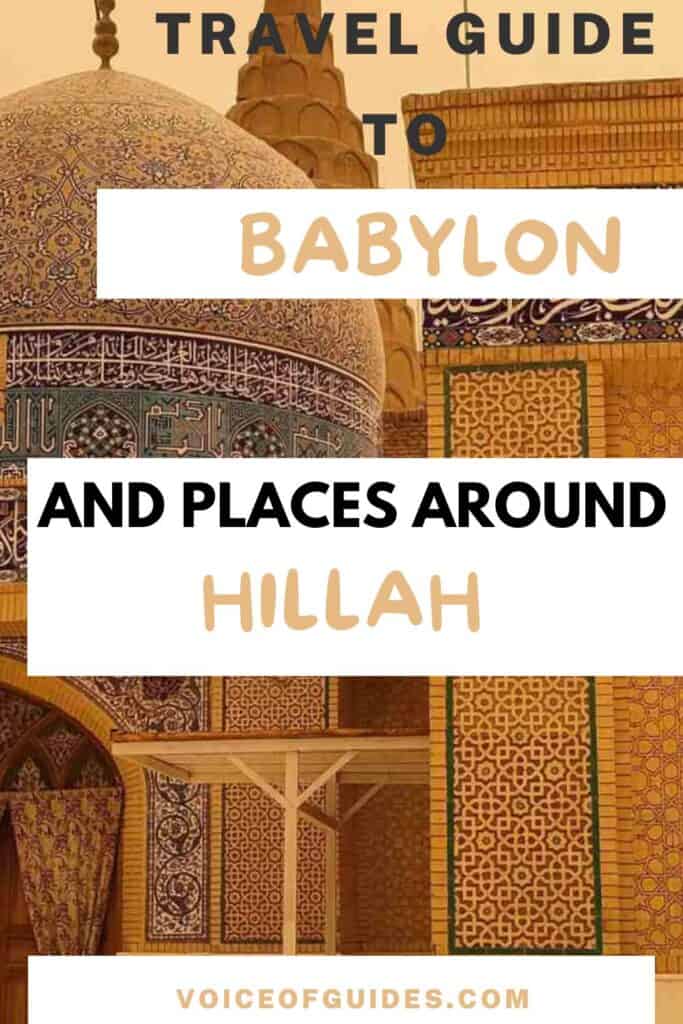
Visiting the Babylon Ruins | Where Is Babylon Today?
By Author Christian L.
Posted on Published: October 5, 2020 - Last updated: November 26, 2021
Categories Destinations , Historical Places , Iraq , Middle East
No other place in the world has a more historical sound to its name than the ancient city of Babylon in Iraq. It was one of the most important kingdoms that the world has ever seen and the place where Alexander The Great passed away, aged 32 years old.
After years of colonial looting coupled with the crazy dreams of Saddam Hussein, along with massive American destruction during the Iraq 2003 invasion, the legendary city of Babylon today has almost vanished.
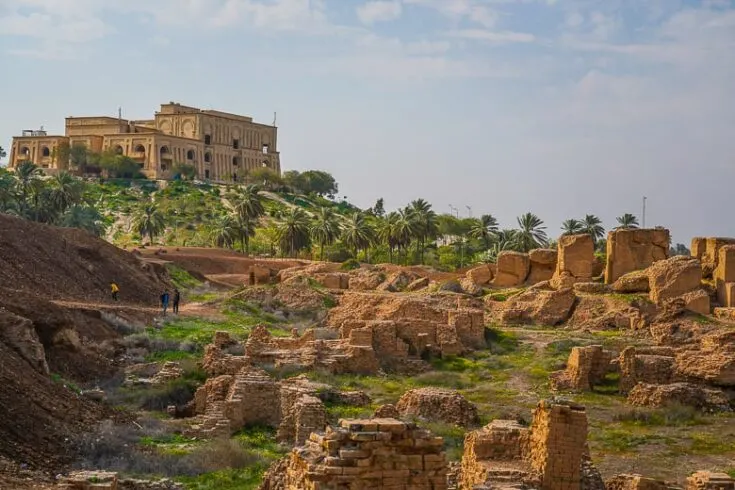
Of all the world’s ancient cities, none can compete with the legendary ancient city of Babylon, Iraq. This site is where one of the seven original seven wonders of the ancient world was once believed to stand. It was known as “the hanging gardens of Babylon” and home to the Tower of Babylon/Babel.
The Historical Babylon ruins were finally added to the UNESCO World Heritage list on 5th July 2019. Although there’s not much left these days, old relics are laying all over the area unprotected. After heavy rain old pottery and coins become visible.
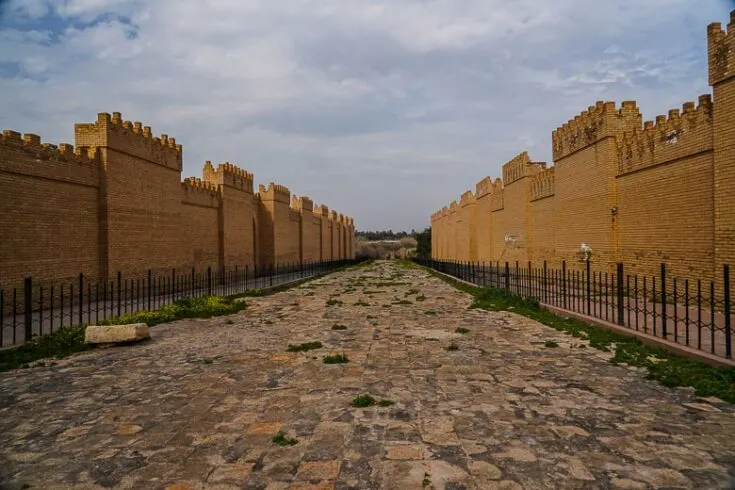
Where is Babylon located?
Modern-day Babylon’s location is in the southern part of the country, around 95 km (59 miles) south of Iraq’s capital – Baghdad . It runs along the Euphrates river and 49 km east of the holy city of Karbala.
The closest city to Babylon is the city of Hillah, the capital of the province. Hillah itself was once a major center of Islamic scholarship and education.
The Jewish prophet Ezekiel’s tomb is located just outside Hillah. The tomb is the oldest and most important Jewish religious site in all of Iraq. The tomb was once put under the protection of Saddam Hussein.
Where Was Babylon Located? A Short History Lesson
Babylon was established during the 19th century BC in the historical region of Mesopotamia, which means “The Land Between Two Rivers”. The two rivers are the Tigris and the Euphrates river.
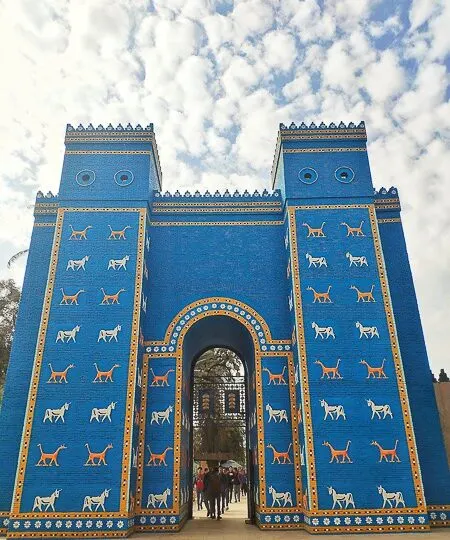
The history of Babylon city goes back almost 4,000 years. Starting from the Bronze Age when the area was occupied by tribes known as the Amorites . The ancient city then developed into a minor city-state, but it was not until King Hammurabi’s reign that they truly flourished (1792 to 1750 BC).
King Hammurabi was most famous for making the world’s first written law, “ the code of Hammurabi ”. The original tablets are now on display in the Louvre Museum in Paris.
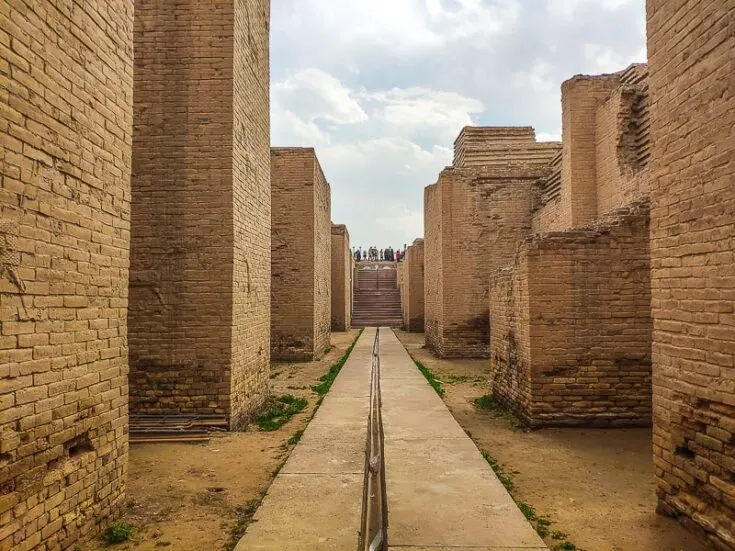
King Hammurabi also conquered all of the surrounding cities, including the famous city of “Ur” and all other minor city-states in the southern part of Mesopotamia. He combined them into one kingdom, and the group of cities was known as Babylonia.
After the death of King Hammurabi in the year 1750 BC, the power over the city regularly changed hands between different tribes and empires before the Assyrians took power over the land in 1000 BC.
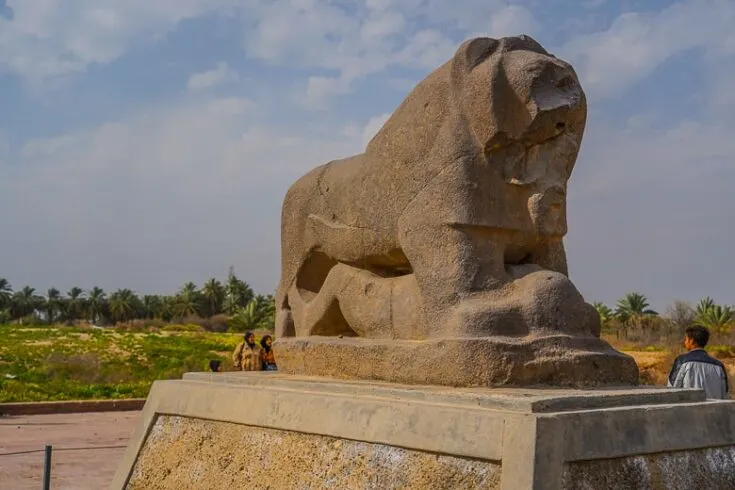
The Lion of Babylon statue was discovered in 1876 by a German archaeological mission, and it´s believed it was built during king Nebuchadnezzar.
This lasted until the death of the Assyrian king Ashurbanipal in 627 BC. His death resulted in political instability that leads to a series of brutal civil wars in which Babylonia eventually rebelled under Nabopolassar.
Nabopolassar created The Neo-Babylonian Empire (also known as the Chaldean Empire ) in 626 BC. It was considered to be the Golden Age of the city-state. But it was under his son Nebuchadnezzar that Babylon rose to its full glory and became the world’s largest city at that time with what is believed to have been a population of 200,000.
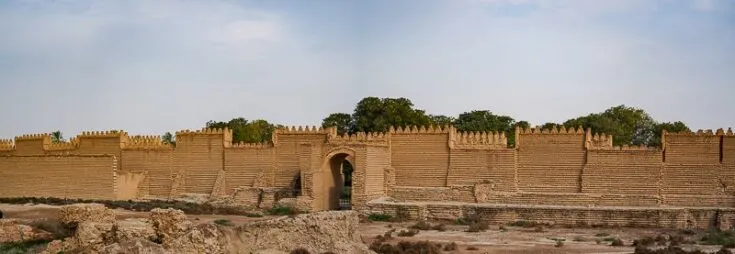
Nebuchadnezzar ordered the complete reconstruction of the imperial grounds, including the Etemenanki ziggurat , and the construction of the Ishtar Gate, the most prominent of eight gates that once stood around Babylon.
Nebuchadnezzar is also believed to have ordered the building of the Hanging Gardens of Babylon, one of the Seven Wonders of the Ancient World.
Many historians believe that the Hanging Gardens were actually located in the Assyrian capital of Nineveh.
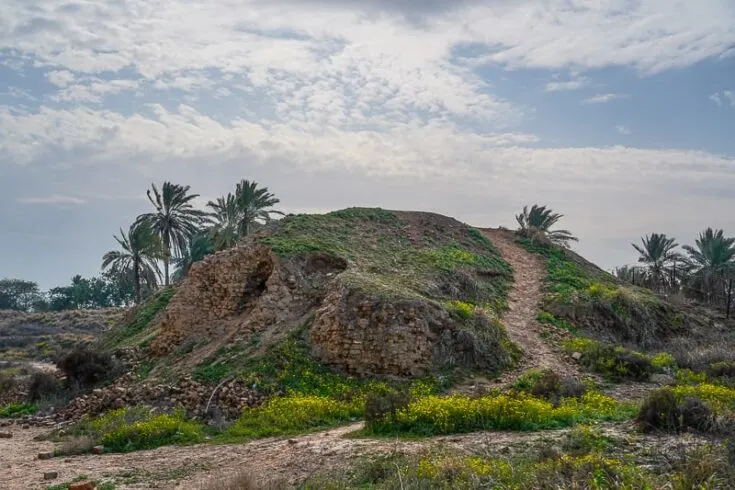
The work of Nebuchadnezzar’s Babylon is spread over two thousand acres. It formed the most significant archaeological site in the Middle East. Only about 5% of Babylon is believed to have been excavated by archaeologists today.
Nebuchadnezzar was considered to be a very successful military leader after his campaigns in Syria and Arabia. His takeover of Jerusalem in 589 BC, where he was in charge of the destruction of Solomon’s Temple (also known as the First Temple), was a stand-out point.
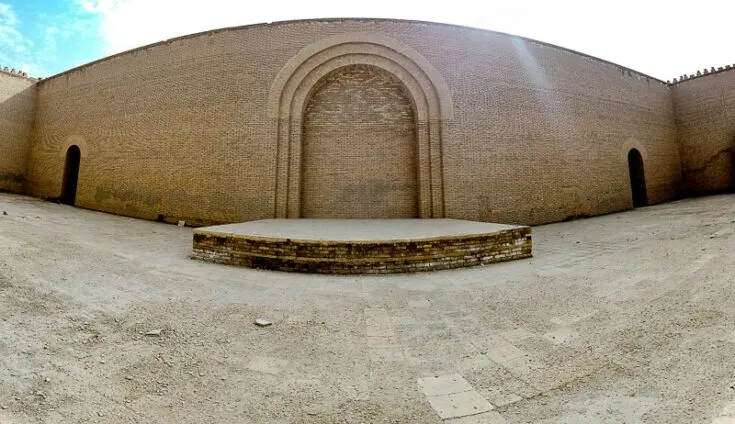
By 572 BC, Nebuchadnezzar was in full control of Babylonia, Assyria, Phoenicia, Israel, Philistinia (present-day Palestine), northern Arabia, and parts of Asia Minor. He also invaded Egypt in the year 568 BC. Nebuchadnezzar died in the year 562 BC after 40 years of power.
After the death of Nebuchadrezzar, the city then had four more kings before the Persian ruler, Cyrus the Great, took control in the year 539 BC. Babylon would stay under the Persian Empire’s rule for two centuries before Alexander the Great then conquered Babylon in 331 BC.
He had plans to make Babylon the capital of his empire but died there in 323 BC before his dream came into reality. Alexander’s generals divided his empire among themselves immediately after his death. This is how general Seleucus obtained the historical city of Babylon.
Not long after, he moved most of the population to his new capital Seleucia, which left the city decaying and deserted. unfortunately, so was Babylon was then plundered for materials for building new cities like mighty Ctesiphon, Baghdad, and even Basra in far south Iraq .
Between the years 1889 and 1917, the area was extensively excavated by a German archaeology team led by Robert Koldewey. Various parts were cleared, including Ishtar Gate, which was dismantled and re-erected in Berlin, a project which took over 20 years to complete. It can now be viewed in the Pergamon Museum in Germany.
The Ruins of Babylon Now & During Saddam Hussein’s Time
During the reign of Saddam Hussein, a lot of reconstruction took place around this historical place. One of his massive Palaces was built on a hill overlooking the ancient city.
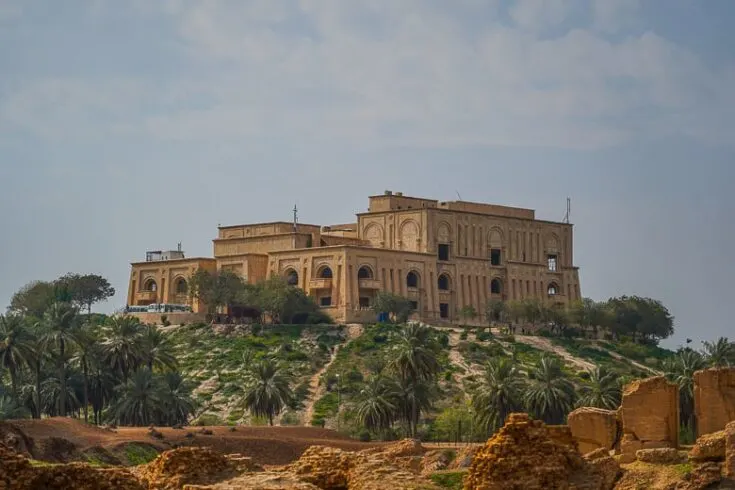
Saddam Hussein imagined himself as a modern-day Nebuchadnezzar. So, he ordered the rebuilding of the ancient ruins. In 1983, the reconstruction of the historical ruins began, and new bricks were placed directly on top of the ruins, some 2500 years old. This sparked big protests from UNESCO and many scholars around the world.
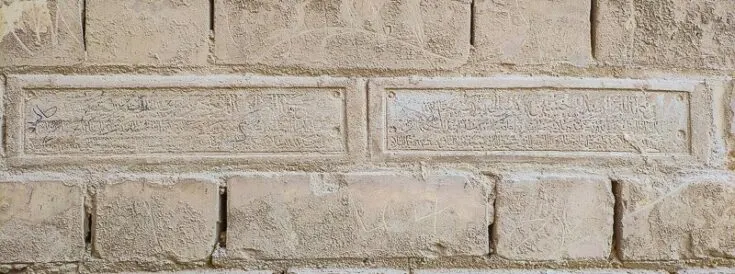
Like on other historical sites around Iraq, Saddam Hussein had his name inscribed on the new bricks. A sample inscription translates to: ”In the reign of the victorious Saddam Hussein, the president of the Republic, may God keep him, the guardian of great Iraq and the renovator of its renaissance and the builder of its great civilisation”.
The rebuilding of the ruins was done in 1987 by thousands of workers from Sudan during the middle of the Iraq – Iran war.
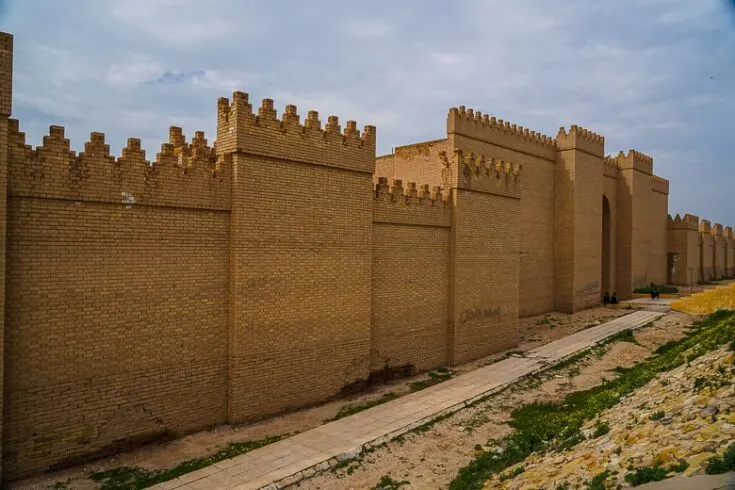
At the end of the Persian Gulf War, he commissioned a personal palace to be built over more of the ruins in the same pyramid style as a Sumerian ziggurat, calling it Saddam Hill.
The massive gaudy structure almost completely covered the original ruins, outraging archaeologists. He also had plans for a cable car to run over the ruins, but it was halted with the 2003 invasion.
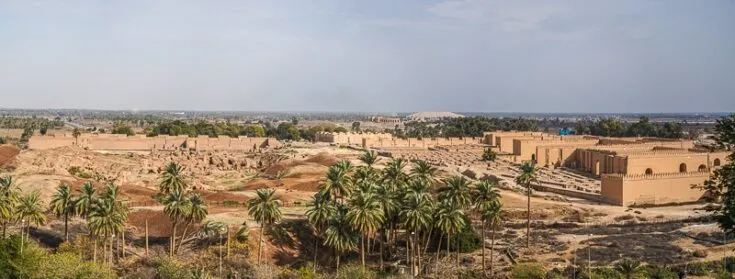
What happened to Babylon During the 2003 Iraq Invasion?
During the illegal 2003 invasion of Iraq, the occupation of US Forces did a lot of damage to the old ruins. This was caused by troops driving their 60-ton Abrams tanks around the ruins. The US Army also set up Camp Alpha around the ruins, which further led to its decay.
A huge area was leveled to create landing pads for helicopters and parking lots for vehicles. Tanks rumbled over the ancient bricks, and Polish troops dug trenches through a temple. Soil, holding artifacts and bones, was scooped into sandbags and taken back to America.
Even when walking around the ruins now, you will see thousand-year-old pottery just laying around.
Babylon Ruins Today
Is Babylon inhabited today? No, but the site was once again open to tourists in 2009. However, after years of destruction, there is not much left of the historical ruins today.
You can see the rebuilt ruins from Saddam Hussein’s area. Even his castle, which overlooks the ruins, is now open to the public. But unfortunately, the whole inside of the palace has been looted.
There are no fences around the crumbling ruins, so locals climb all over. They break off small parts of buildings every day. So, if nothing is done soon to preserve the ruins, Babylon will be all gone.
On my walk around the outskirts of the ruins, I saw thousand-year-old pottery broken all over the ground. Nobody is taking care of it, which is such a shame. My local guide found 2 old coins in the rubble during my visit, and this was completely normal, according to him.
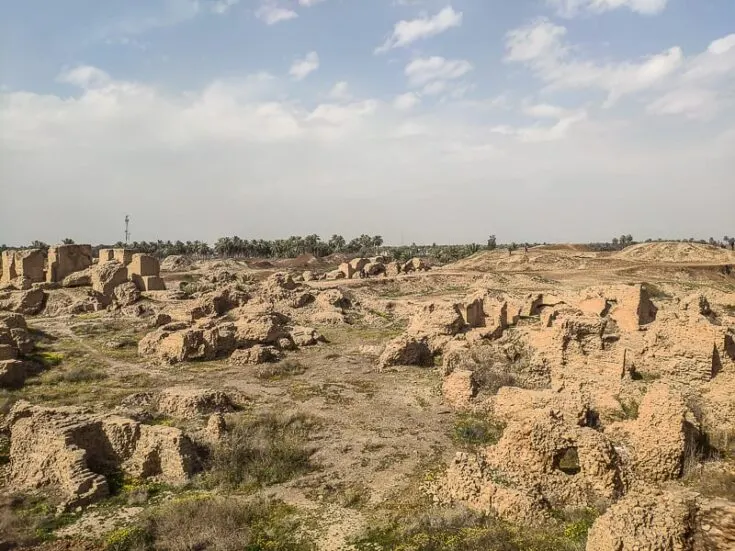
Even an oil pipeline runs through the eastern part of the ancient city these days, going right through the outer wall of ruins.
Like all other locals that worked here with the local tourism industry before 2003, my guide openly admitted that everything was better under Saddam’s rule. A common phrase to hear in Iraq is “Saddam Hussein was a horrible person, but the Americans were so bad that they made Saddam look like an Angel.”
Can You Visit Babylon Today?
Although many local tourists now enjoy frequent visits to this historical place, few tourists have made the journey since it reopened to the world in 2009. Even tho more and more western travel companies now arrange trips here. However, since being made a UNESCO-heritage site in 2019, this is sure to change.
There are a few English-speaking guides available for hire. Most of them worked there before the 2003 invasion and are happy to share all their information about this place and how much of it was destroyed by the foreign military forces.
If you are a fan of ancient history, then what better place to explore than Babylon ruins in Iraq or Persepolis in neighboring Iran another historical place that Alexander the Great conquered.
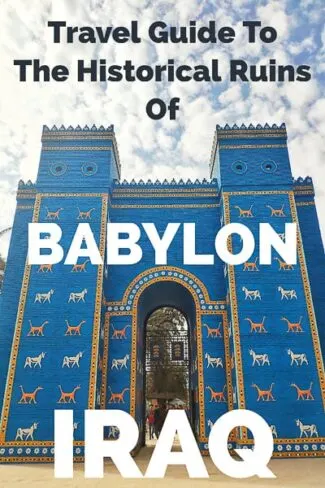
Thursday 18th of May 2023
Can you cite your sources about US invasion of Iraq helping to destroy parts of Babylonian ruins? Even without reading the original sources (if any), I find your claims INCREDULOUS, even LUDICROUS! I am not am American btw.
Christian L.
Friday 19th of May 2023
From the guides in Babylon and the locals, and you could clearly see broken ruins
Tuesday 9th of August 2022
Can you leave your religious ignorant nonsense out of the conversation here? This blog is for educated open minded travelers who love historical sites and archeology. And facts. And science.
Saturday 12th of August 2023
History is about to repeat it self. Jesus is coming for us that is the rapture. Babylon is of the devil will dwell
Friday 7th of April 2023
@CK, May you feel Jesus's love calling you. He is the Way, the Truth, and the Life. - No better historical site, facts, or science than Jesus!
Sunday 5th of March 2023
@CK, you're LITERALLY talking about a religious location, who had religion as it's lead, in a country that has religion in the fore. Could you please leave your white atheist logic out the conversation? It was due to your people's disrespectful behaviors that caused FURTHER ruin, and further fulfilment of that very prophecy.. brainiac.
Tuesday 10th of May 2022
Babylon will never be rebuilt. Bible prophecy does not lie. Over 2500 years ago it was written in Jeremiah 51:37- And Babylon will become piles of stones, A lair of jackals, An object of horror and something to whistle at, Without an inhabitant. This is exactly what it is today. IT WILL NEVER BE REBUILT!
Monday 7th of March 2022
jeremiah 50 .39 -43 GOD says it will not be inhabited only animals live there .because marduk was set up there same judgement as sodom . see we have a GOD of judgment and justice who does get angry and who resides from generation to generation
Friday 18th of February 2022
This was a good article, but a little too much America hating in it. Yes, there was probably some damage to the area during the invasion and occupation in 2003, but there were strict orders for American personnel not to disturb the archaeology. Our platoon was given a tour of the ruins and rebuilt parts during our time there in 2003. We were not even allowed to scoop up a small sample of dirt for a keepsake. Much of the damage to Babylon was actually a result of the rampant looting in Iraq after the fall of the Hussein regime. It is one e of my best memories from my time there and it is one many American service members have talked about from there time in Iraq.
Sarah Hedger
Wednesday 24th of May 2023
@James, thanks for your service
Babylon, Iraq: Ultimate Travel Guide
- Author david
- Date October 28th, 2023
Welcome to the ancient city of Babylon, Iraq ! Located roughly 50 miles south of Baghdad in present-day Iraq, Babylon holds a significant place in history. With a legacy dating back to the 18th century BCE, Babylon was once the capital of the mighty Babylonian Empire.
This city is famous for its architectural wonders, including the iconic blue Ishtar Gate, Nebuchadnezzar’s Palace, and the Hanging Gardens, one of the Seven Wonders of the Ancient World. I had the pleasure of visiting it thanks to my guides Jafar and Ali from Bil Weekend .
History of Babylon
Babylon was not only a center of political power but also a hub of intellectual and cultural achievements. It was home to famous scholars, astronomers, and mathematicians, who made significant contributions to various fields of knowledge. The Code of Hammurabi, one of the earliest known legal codes, was created in Babylon.
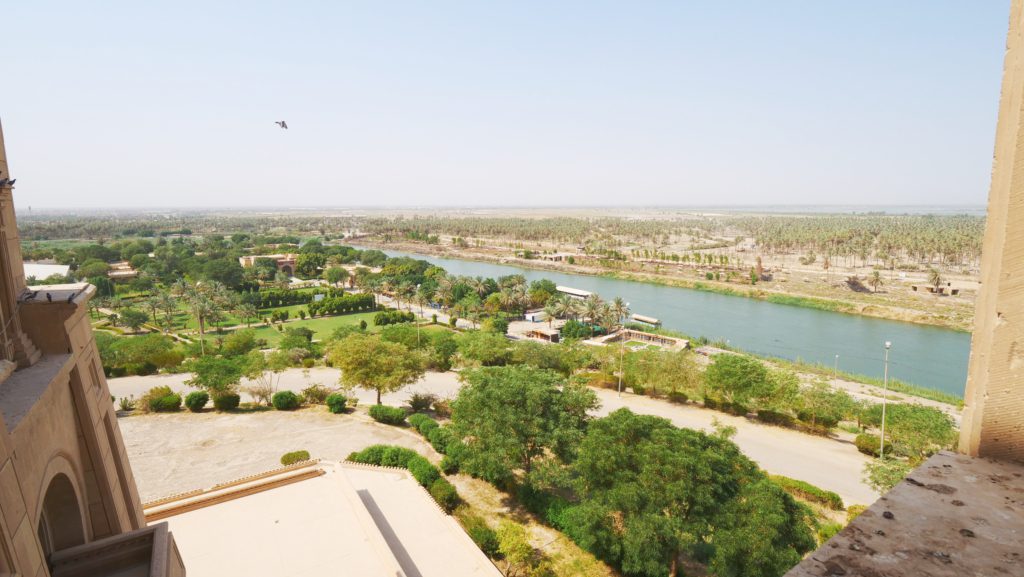
Alexander the Great had a significant connection to the ancient city. The infamous conqueror chose Babylon as his capital after taking down the Persian Empire. He admired and respected Babylon’s rich history and sought to incorporate its influence into his own rule and administration. He would later die in the city of a mysterious ailment in the palace of Nebuchadnezzar in June 323 BC.
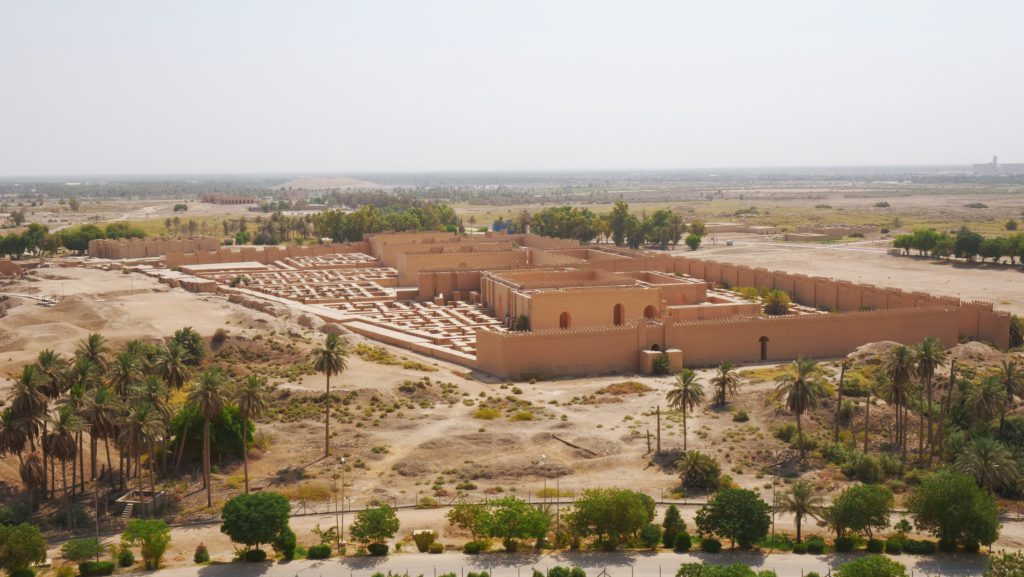
Despite the passage of time, Babylon continues to captivate the imaginations of historians, archaeologists, and visitors alike. Now a UNESCO World Heritage Site, Babylon is a treasure trove of ancient ruins, which I got to visit in September 2022 with my friends from Bil Weekend.
On the Road from Baghdad, Iraq to Babylon
For three weeks every year, roughly 20 million pilgrims make the trek from Baghdad to Karbala to the southwest. The pilgrimage commemorates a battle that took place 1400 years ago. Along the roughly 65-mile-long route, generous vendors offer free food to travelers making their way between the cities.
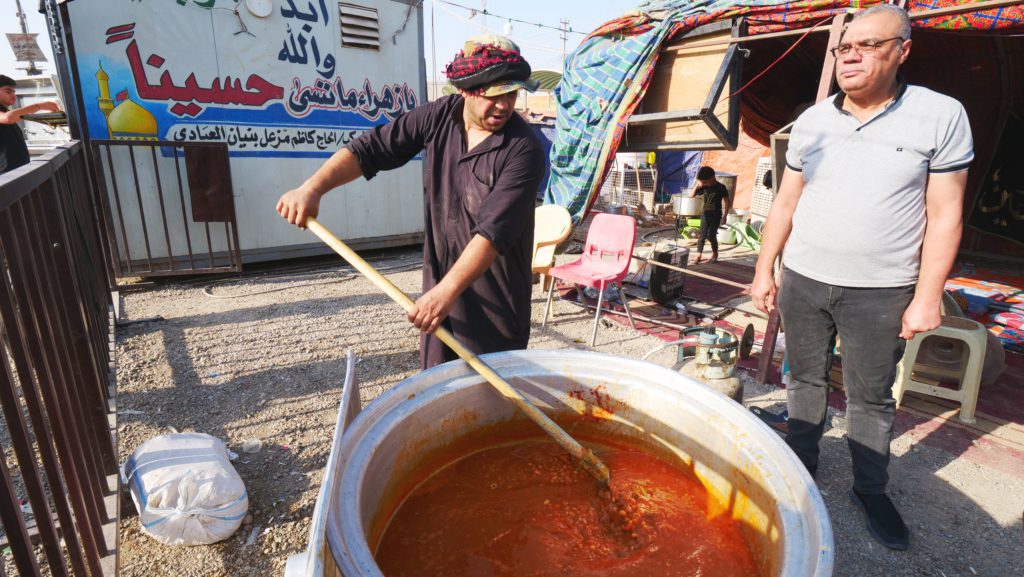
Vendors offer dishes such as lentil stew and fava-bean-and-lamb stew called fasolia. They also had some delicious khubz tannour, a flatbread made in a tanoor oven. They were out of the lentil stew by the time we arrived, but there was still plenty of fasolia left. The mix of al dente beans and tender, fatty lamb blew me away. It was hearty and rich, and was a wonderful way to experience a bit of an Iraqi tradition!
Visit the Palace of Saddam Hussein
One of the most infamous leaders in modern world history was Saddam Hussein. The President of Iraq from 1979 to 2003, Hussein was notorious for his brutal dictatorship. Decades after his execution in 2006, his lavish palace just outside of Babylon still stands, abandoned and derelict.
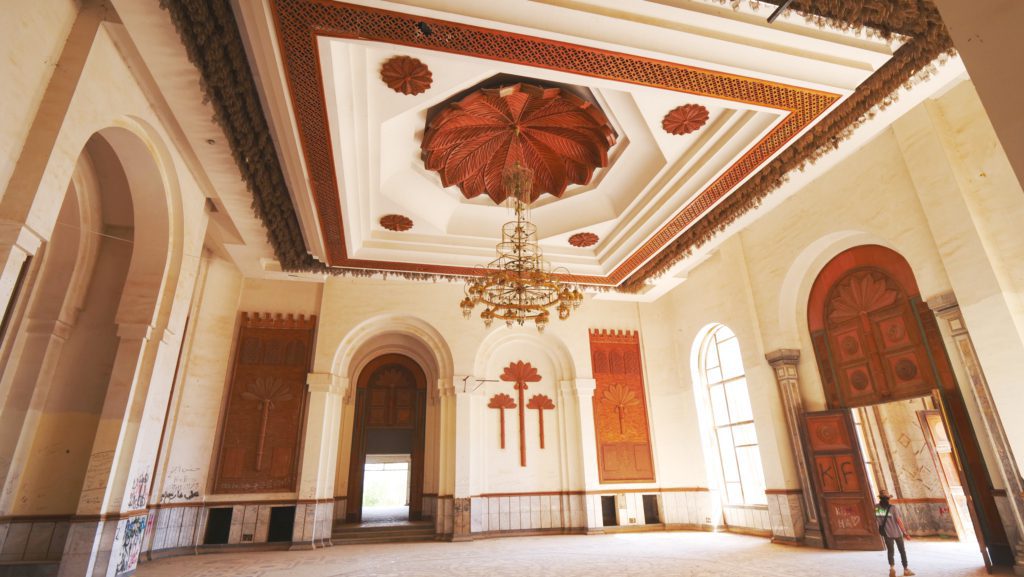
The interior of Saddam’s palace was breathtakingly large. The dictator designed the magnificent structure to resemble the famous Hanging Gardens. The outer walls of the palace were adorned with intricate patterns depicting the Arabic letters for “SH”. The palace boasted impressive acoustics, adding to its grandeur.
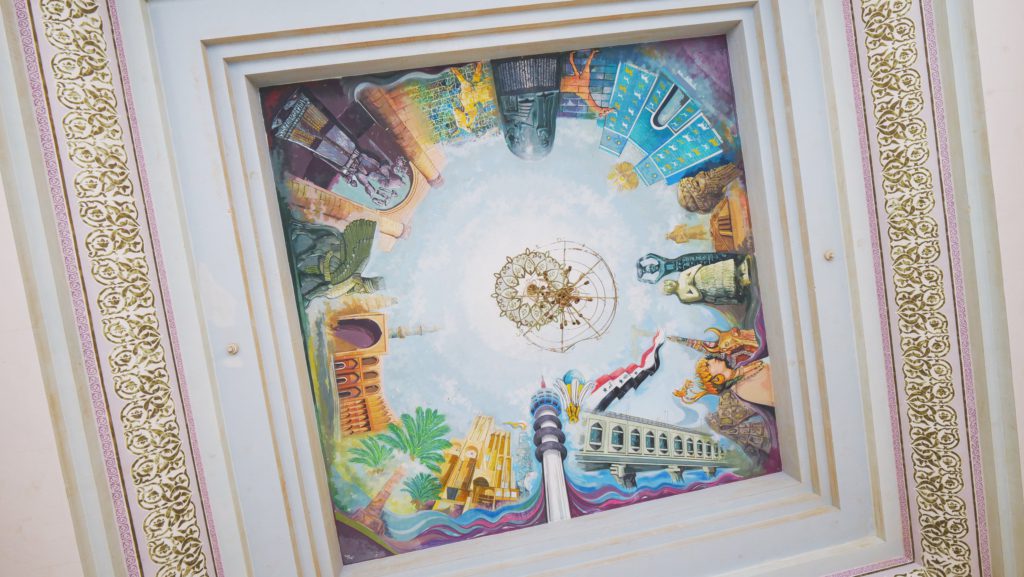
Thanks to our VIP access, we were able to explore more areas of the palace. We headed through the kitchens and made our way up to the master bedroom. It was massive but covered in dust due its disuse since 2003. From the rooftop, we had a panoramic view of Babylon, including a glimpse of the majestic Euphrates River. Our guide even showed us the rumored former location of the Hanging Gardens!
See the Iconic Ishtar Gate
The most well-known landmark in the ancient city of Babylon, Iraq is the Ishtar Gate . King Nebuchadnezzar II built the gate, known for its vibrant blue bricks, around 575 BCE to serve as the city’s main entrance. He dedicated it to the Babylonian goddess Ishtar, as well as other deities. Carved and painted on the gate’s walls are animals including bulls, lions, and dragons.
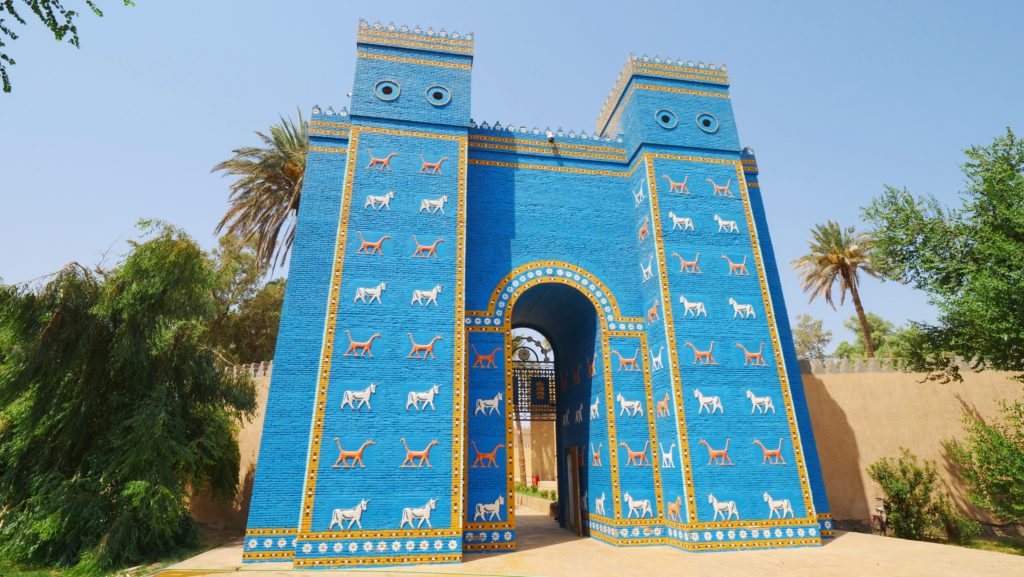
However, the structure that currently stands at the entrance to Babylon is not the original Ishtar gate. Archaeologists excavated the original gate between 1902 and 1914. You can now see pieces of it in various museums around the world. An incomplete reconstruction stands in the Pergamon Museum in Berlin, Germany.
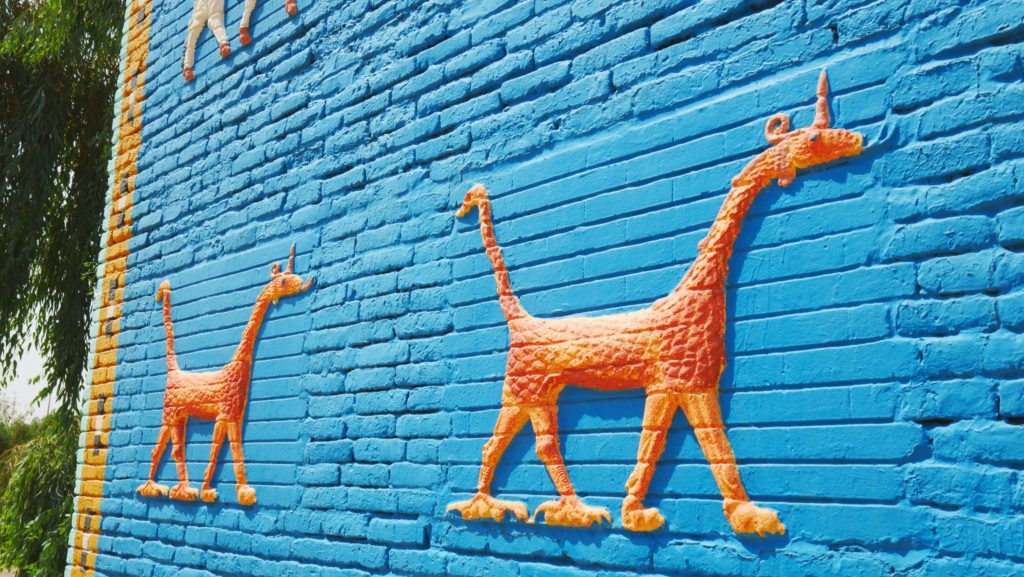
Seeing such an icon of world history with my own eyes was incredible for me. I’ve wanted to visit Babylon since I was a kid, so finally being there and seeing the gate—even though it’s a replica—blew me away. It’s quite beautiful and is a must for anyone traveling through Iraq!
Explore the Ancient City of Babylon, Iraq
Inside the city of Babylon, Iraq, on the other side of the Ishtar Gate, lies a map showing the locations of the city’s prominent ruins. As you venture through the gate, you’ll see the remnants of old buildings, the iconic Street of Procession, and the Southern Palace. With a staggering 600 rooms, this palace served as both an administrative center and a defensive stronghold.
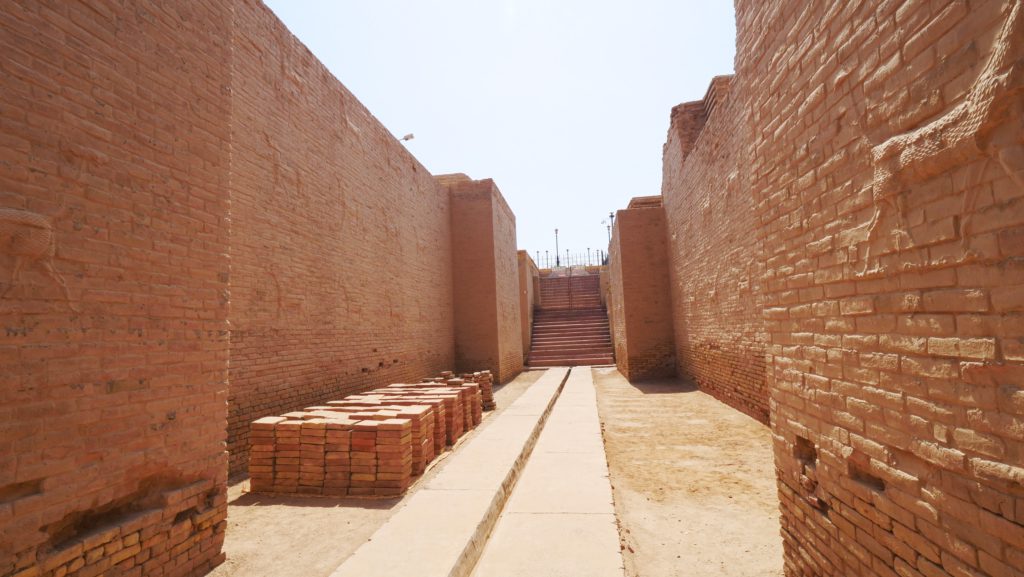
During our exclusive tour, we were granted access to a restricted area that is typically off-limits to most visitors. Adorning the walls are intricate depictions of dragon-like creatures reminiscent of those found on the famous Ishtar Gate. Interestingly, all these creatures face north, which is believed to be the direction from which kings would arrive.
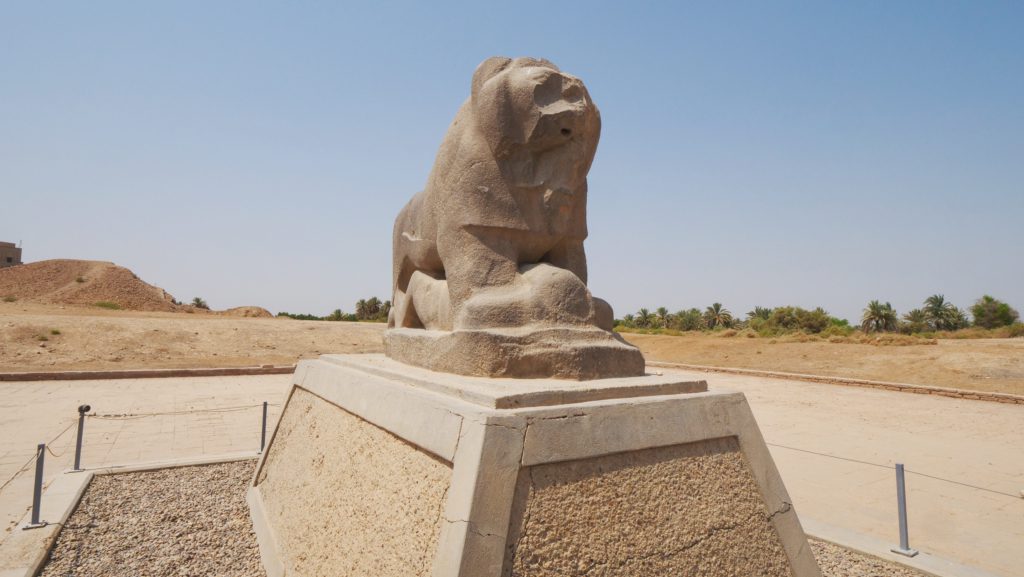
Moreover, we had the privilege of visiting the Temple of Ninmakh —an awe-inspiring structure crafted entirely out of mud—as well as witnessing the grandeur embodied by the Lion of Babylon statue. We also visited the Throne Hall, which is where Alexander the Great died!
My favorite dish I tried in Babylon, Iraq is a hearty rice dish called quzi . Quzi consists of slow-cooked lamb, roasted nuts, and raisins, all served over a bed of fragrant rice. In Iraq, it usually consists of a whole lamb stuffed with rice, vegetables, spices, and nuts. You can find variations of it in other Middle Eastern countries, including Jordan , Oman , and Saudi Arabia.

I loved the mixture of biryani rice, tender lamb, raisins, and roasted nuts. It was savory and sweet, nutty and earthy. I enjoyed it with fasiola yabsa, which is a white bean stew, an okra stew called bamia, and a popular tomato-and-eggplant dish called tepsi baytinijan. If you enjoy other Middle Eastern rice and meat dishes like kabsa , shuwa , and zarb, this dish is righ tup your alley!
Book a Trip to Babylon, Iraq
Visiting Babylon, Iraq was a dream come true. From seeing the vibrant blue bricks of the legendary Ishtar Gate, to walking the streets of the ancient city, to enjoying one of Iraq’s most beloved dishes, I was in heaven. As a history buff and a foodie, it was one of my favorite days of my entire trip.
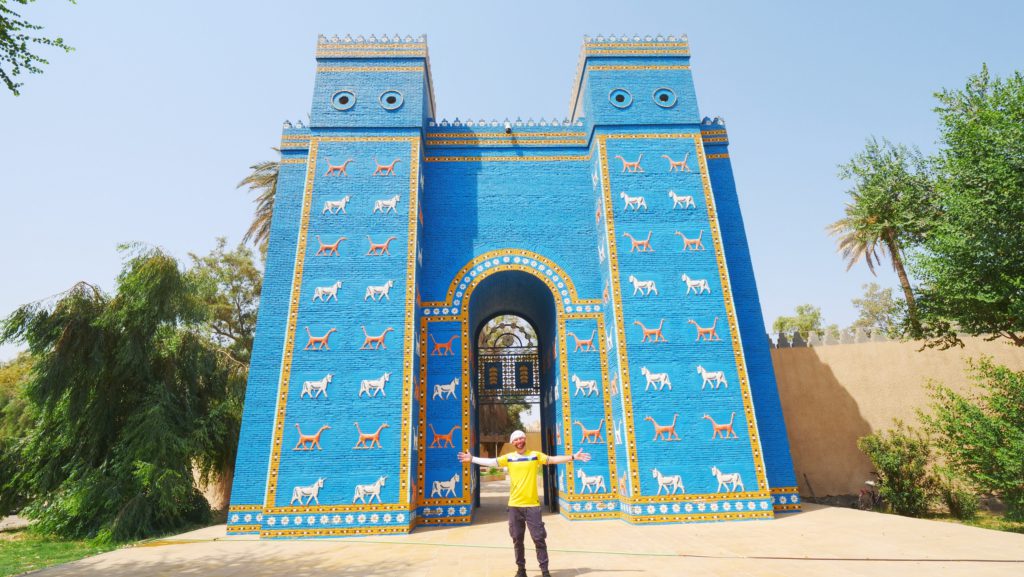
If you’re a history fanatic like me, don’t forget to visit Babylon. It’s an easy day trip from Baghdad and is along the route to Karbala. I have a feeling you’ll enjoy it as much as I did!
Become a member for $5/month!
Connect with me, leave a reply cancel reply.
Your email address will not be published. Required fields are marked *
Related Posts
Erbil, iraq: ultimate travel guide, mosul, iraq: ultimate travel guide, basra, iraq: ultimate travel guide, helpful links.
101 Countries • 1432 Cities

- Our Mission & Values
- Staff & Board
- Privacy Policy
- World Monuments Watch
- 2022 World Monuments Watch
- Featured Projects
- Explore Sites & Projects
- Attend an Event
- Travel with WMF
- Jewish Heritage Program
- Ukraine Heritage Response Fund
- Heritage from Home
- Support Our Work
- More Ways to Give
- International Council
- Planned Giving
- Institutional Giving
- Crisis Response
Stay connected
Babylon, iraq, a heritage from home virtual tour.
This video was released on Thursday, December 9, 2021.
The ancient city of Babylon, once the capital of a sophisticated and vast empire, today represents one of the most important archaeological sites in the world. After thousands of years, the remains of Babylonia's legendary capital continues to yield insight into the complex past of the empire and is one of the most popular sites in Iraq.
Regional Director Jeff Allen will lead viewers through Babylon to uncover the hidden secrets of the ancient world and go behind the scenes of one of the most famous World Heritage sites. With a visit to the elegant Ishtar gate and the popular Lion of Babylon, this virtual tour will provide insight into the unique threats to Babylon’s heritage and WMF’s 12-year project to address them.

Jeff Allen , WMF Program Director
Based in Cairo, Egypt, and Berlin, Germany, Jeff Allen is a project planner who joined WMF as a consultant on the Future of Babylon Project in 2009 and as a staff member in 2013. He specializes in managing field projects that contain community components, especially those aimed at building the capacity of local heritage professionals to encourage project sustainability. Prior to his experiences with WMF, he worked in the field for 15 years on projects in the Middle East and Asia.
About Heritage from Home
Heritage from Home brings viewers behind the scenes to some of World Monuments Fund’s most iconic sites around the globe guided by the WMF experts who safeguard them for the future.
Subscribers to this series will receive a new video in their inbox once a month.
GPB Originals
Browse by genre, featured programs, featured programs & series, more gpb news, for kids & teachers, ghsa sports, high school football, browse by type, browse by category, for parents & caregivers, support gpb, gpb newsletter cta, banner image, section branding, header content, tagged as: , 'it was like magic': iraqis visit babylon and other heritage sites for 1st time.
February 23, 2021 2:44 PM
- Alice Fordham
Share this page
Primary content.
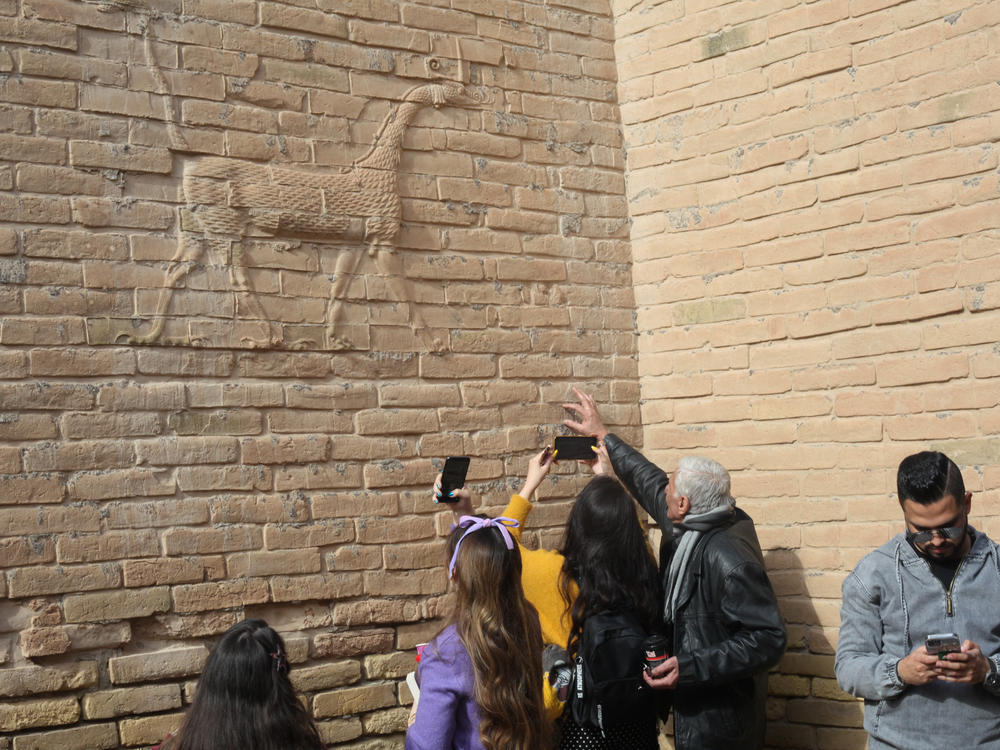
BABYLON, Iraq — On a mild winter weekend, the sun pours down on the yellow archways of the reconstructed palace of King Nebuchadnezzar II at the site of the ancient city of Babylon. Nearly three millennia after Nebuchadnezzar's reign, visitors from a tour group cluster to admire a brick frieze depicting strange creatures that look like lions with eagle claws.
Snapping photographs, they pass under arches, through hallways and across vast courtyards, imagining the regal ceremonies, worship and gossip of the past.
"It's great!" says Furqan Fouad, a 21-year-old Iraqi visitor. "It's my first time coming here and I'm very interested in history because I'm a novelist."
She's carrying a copy of her novel, whose cover is purple like her sweater and hairband. "It's a sci-fi and a fantasy, and it's about Ishtar," she says, referring to a Mesopotamian goddess of love and war.
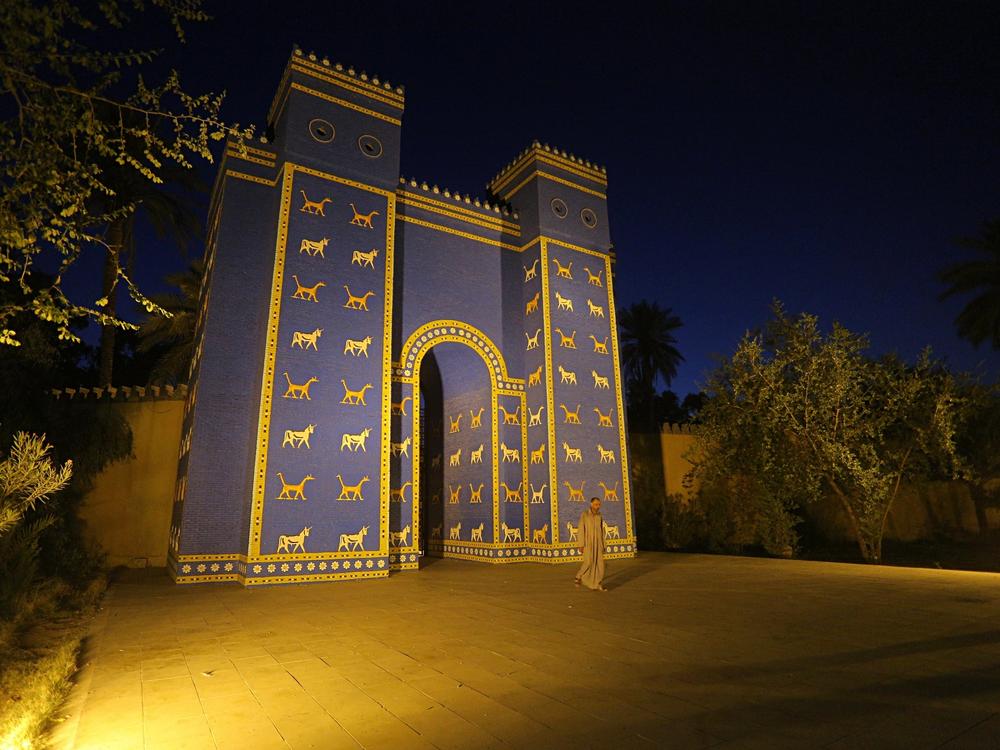
The Babylon ruins, once the capital of Nebuchadnezzar's empire, are among many archaeological sites in Iraq bearing witness to some of the world's oldest and most magnificent cities. Named a UNESCO World Heritage Site in 2019, the site is about an hour and a half's drive south of Baghdad. But even before the pandemic, relatively few people came.
"I'm 25 years old now, and I feel like it's a pity I didn't come here before — because when I came, it was like magic, really," says dentist Abdullah al-Khateeb.
While domestic tourism has traditionally been strong in Iraq's northern Kurdish region, sites like Babylon, in more impoverished, insecure areas, are largely overlooked. Khateeb says when he was growing up, in the violence that followed the 2003 U.S.-led invasion of the country, the road south of Baghdad was dangerous and people weren't in the habit of taking an educational day trip.
"It's not the lifestyle here," he says. People "don't show the country to their children."
Today he's visiting with a tour company trying to change that. Bil Weekend ("At the Weekend") was founded by Ali Al-Makhzomy, who was working at Iraq's culture ministry when, one weekend in 2015, he decided to take a trip to Babylon. When he arrived, the site was closed.
"The guards said the site belongs to the government, and the government has Friday and Saturday as days off," Makhzomy says. His connections in the ministry allowed him to slip in and wander around, but he thought it ridiculous that regular Iraqis couldn't visit their heritage on their days off.
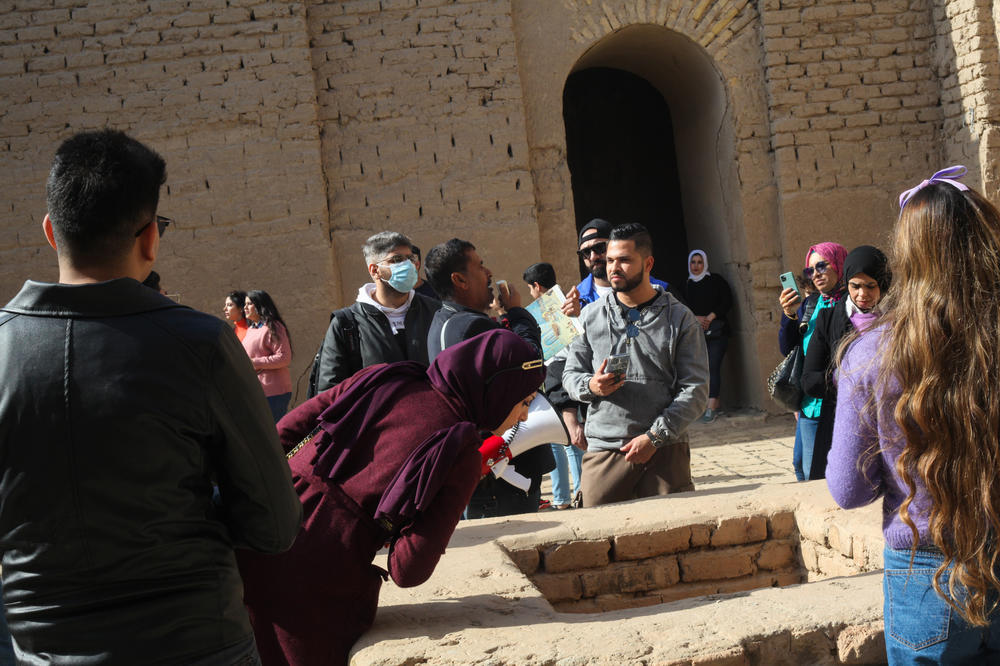
He grew up with a love of Iraq's culture. "My family started this, feeding me with books, feeding me with love of heritage and culture," he says. "I always read about Iraq's history, about Mesopotamia. I always admired what used to be in Iraq, all the civilizations." He wanted more people to see the ruins.
So he asked his boss for permission to arrange a day trip on a Friday from Baghdad to Babylon for friends and families. He sold tickets (at a loss, that first time), rented a bus, took a musician, had a picnic. Bil Weekend's business concept was born.
The company now runs regular weekend bus tours, complete with picnics and musicians, to Babylon, and is one of a handful of companies doing so from Baghdad. Makhzomy says gradually his team got to know officials from the State Board of Antiquities and Heritage in Babylon, and was allowed to enter on weekends without problems. (It is now open on weekends to the public).
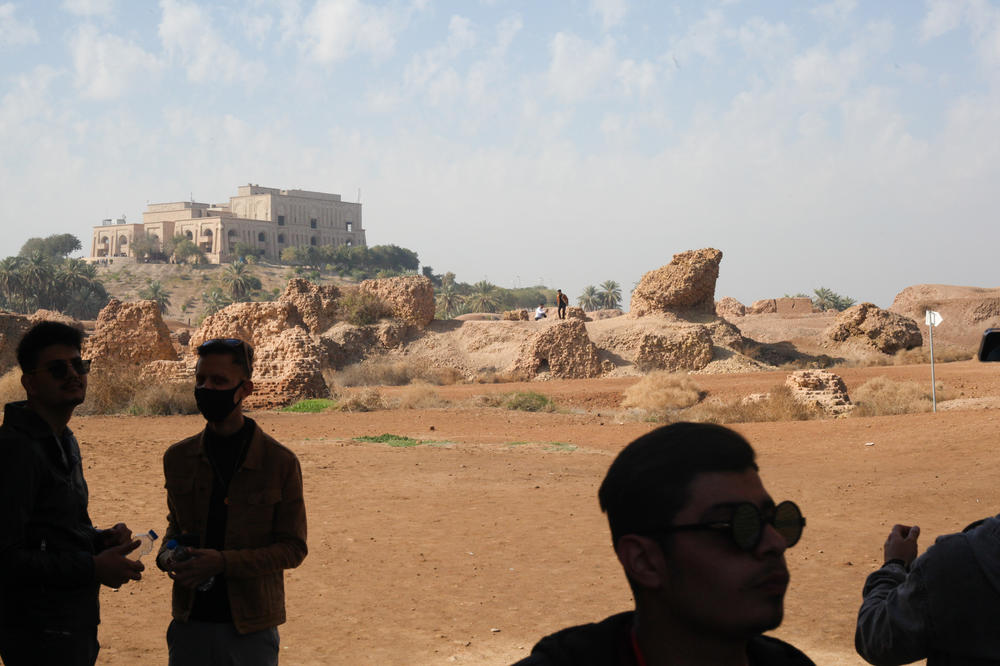
A musician plays old Iraqi songs on the oud while the visitors sing along. The reconstructed brick halls their voices echo around are fragile and have seen much upheaval in the last century. Foreign archaeologists began excavating the site a century ago, and many of its treasures ended up in Europe, with remnants of glazed tiled friezes and a large archway all taken to Germany.
The dictator Saddam Hussein left his own mark. He rebuilt a version of the palace on top of the mud-brick ruins; some of the bricks bear an inscription glorifying him. And then, in 2003, the U.S.-led invasion shook the country. Babylon was not spared.
"All this was like a camp for the army, armored vehicles and planes," says an official tour guide, who did not want NPR to name him because he doesn't have permission to speak to media.
American forces turned the site into a base, which was briefly used by Polish forces. A 2009 UNESCO report documented extensive damage — including "smashed bricks" and "effects of heavy vehicle wheels" — by multinational forces.
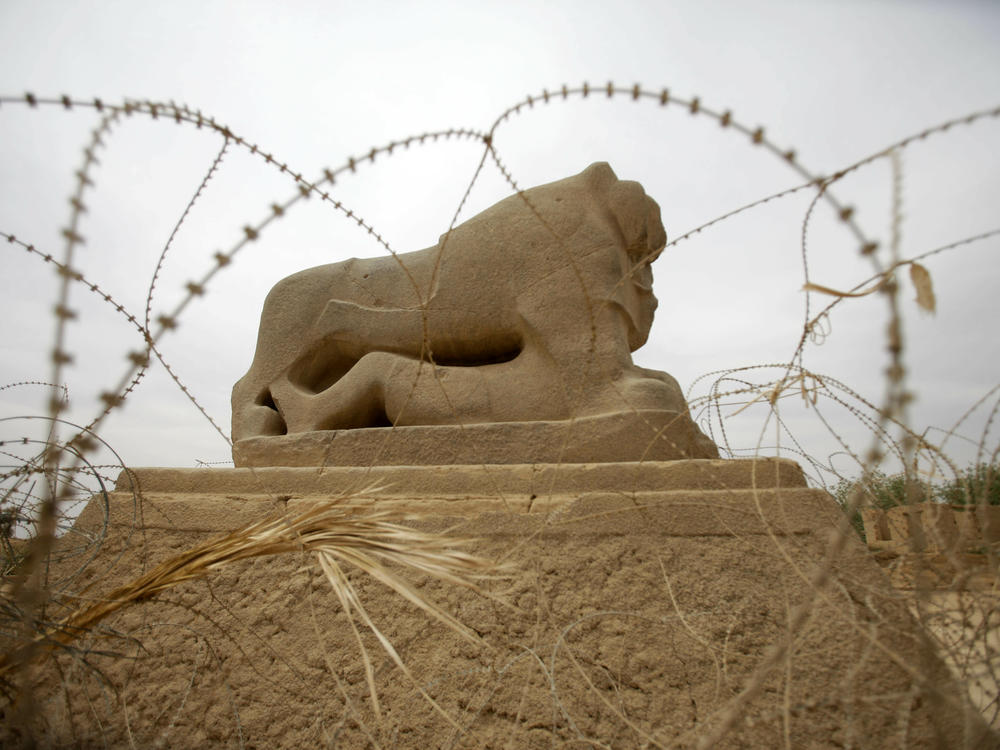
"The airport was close to the temple that we visited," the guide says, gesturing toward part of the complex housing an ancient temple. "An airport for military planes. When they took off, they shook the city."
He says armored vehicles also parked near the more than 2,000-year-old basalt Lion of Babylon, depicting a lion trampling a man.
When foreign forces left the site in 2004, Iraq's security was beginning to worsen. The guide — who also worked as a guide in those days — says he received a death threat and lived in fear for his life for years. Now, he says, things are better. It makes him happy to take tour groups around the site, as his father and grandfather did before him.
"If someone visits with his family, he comes again, and brings other families with him," he says.
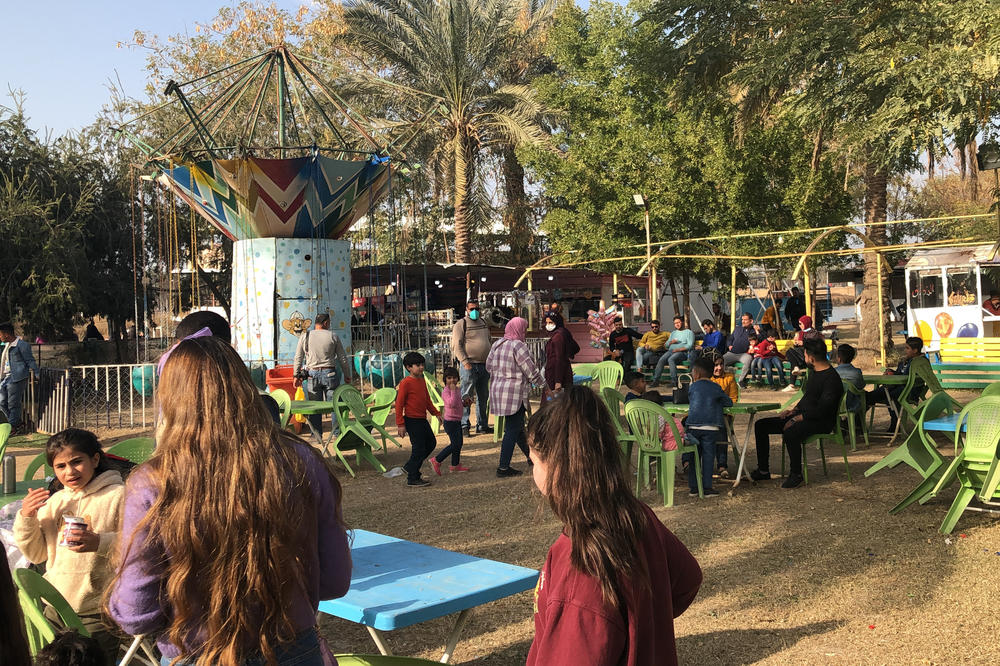
Since Babylon reopened in 2009, tourist numbers have fluctuated. The local tourist board says the best recent year for Iraqi tourists was 2017, when more than 35,000 visited. This winter — normally peak season because of the cool weather — the pandemic affected the numbers and about 10,000 came. The year before, many stayed away for fear of being caught up in violence at demonstrations in nearby cities.
But some local investors believe in the promise of domestic tourism in places like this that have long been under-visited.
Several tours now run from Baghdad to the scenic marshlands of the south — which some scholars say may have been the biblical Garden of Eden — where sleek buffalo swim through grasses and people live on islands. Tourism has been growing there gradually, as security has improved and hotels have opened.
Nearby, visitors can also see a reconstruction of the famed ziggurat in the ruins of the city of Ur, even older than Babylon.
New hotels have opened in Nasiriyah, the closest city.
"Nasiriyah has a special position in Iraq," says Imad al-Atawi, who recently launched two hotels there. "And it has very beautiful nature. We planned to open hotels because we think Nasiriyah will attract many tourists in the future."
His investment is not without risk. Anti-government demonstrations in Nasiriyah have turned violent in recent months.
Still, the tourists visiting Babylon say they're keen to see more of their country.
Sultan Ali takes selfies outside the garish replica of Babylon's famed blue Ishtar Gate, and has been to see the original, rebuilt with its jewel-colored tiles in Berlin's Pergamon Museum.
"I felt actually sad," he says, "because this is our thing — our history, our civilization, our everything, which we have to show to others, not we have to go to Berlin to see."
For now though, while security is fragile, he's ambivalent.
"I want this," he says, "and I don't want it."
After the ruins, he and his friends picnic by the Euphrates River, and take a boat ride. They wander round the shell of Saddam Hussein's old palace. A guide inscribes their names in cuneiform on clay tablets. Immediately, photos of the ancient script glow bright on their Instagram feeds.
Copyright 2021 NPR. To see more, visit https://www.npr.org .
Bottom Content
Related news.
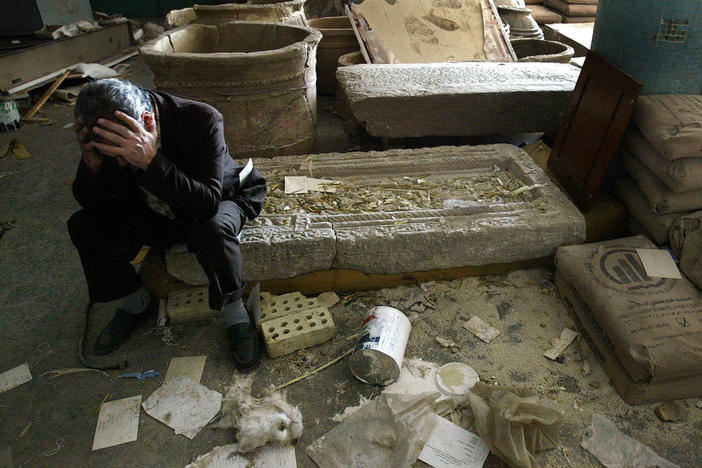
In Iraq, Authorities Continue To Fight Uphill Battle Against Antiquities Plunder
Heritage experts say hundreds of thousands of pieces have been looted at archaeological sites and museums. As the illegal trade in antiquities continues, Iraq is trying to get objects returned.
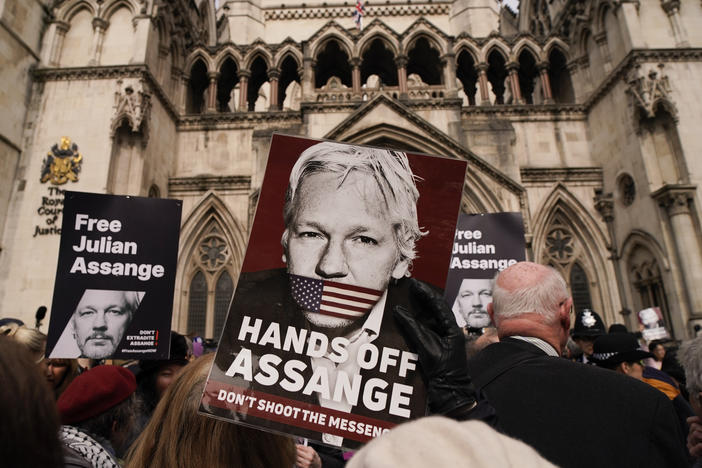
A U.K. court delays extradition of WikiLeaks founder Julian Assange to the U.S.
He spent seven years in the Ecuadorian Embassy and five years in prison, both in London. U.S. prosecutors want his next move to be to the U.S. But the High Court has delayed that.
- Lauren Frayer and
- Fatima Al-Kassab

- National Security
The U.S. targets Iranian proxies for a second day in a row
The new round of U.S. strikes is far more extensive and deadly than those that have been launched since October, when the Israel-Hamas war began and pro-Iranian groups began their attacks.
- NPR Washington Desk

Support Quality Journalism
GPB is committed to bringing you comprehensive news coverage from Georgia, across the country and around the world. Your support makes this possible. Please consider making a gift today to support this vital public service.
- Skip to main content
- Keyboard shortcuts for audio player
Middle East
Iraqis are getting to know historic site of babylon better through tourism.
Alice Fordham
Iraq's historic site of Babylon is famous worldwide, but some Iraqis are just getting to know it again — thanks to tours that introduce them to the past.
Copyright © 2021 NPR. All rights reserved. Visit our website terms of use and permissions pages at www.npr.org for further information.
NPR transcripts are created on a rush deadline by an NPR contractor. This text may not be in its final form and may be updated or revised in the future. Accuracy and availability may vary. The authoritative record of NPR’s programming is the audio record.
- Central African Republic
- DR Congo – Democratic Republic of the Congo
- Somalia – Somaliland
- São Tomé and Principe
- South Sudan
- Afghanistan
- North Korea
- Turkmenistan
- Saudi Arabia
- Yemen – Mainland
- Yemen – Socotra
- 4 days tour
- 10 days tour
- 3 days tour
- 12 day tour
- DRC Kinshasa – 5 days tour
- East DR Congo – Bukavu & Gorillas – 4 days tour
- Congo Brazzaville – 4 days tour
- 5 days tour
- 11 days tour
- 8 days tour
- 6 days tour
- 12 days tour
- 13 days tour
- 10 Days Tour
- 11 Days Tour
- 14 days tour
- 5 days tour – Federal Iraq
- 6 days tour – Kurdistan
- 7 days tour
- Mainland Yemen – 4 days
- Socotra – 8 days tour
- Grand Angola Tour
- West Congo & Cabinda Tour
- Burundi, DRC & Rwanda Tour
- Uganda Tour
- DR Congo Kinshasa & Brazzaville Tour
- Congo, DRC & Cabinda Tour
- Independence Day Tour
- October Tour
- Voodoo Summer Tour
- Highlights Tour
- Grand Venezuela Tour
- Marathon Tour
- Labour Day Tour
- Mt. Paektu & Victory Day Tour
- Liberation Day Tour
- Northeast & National Day Tour
- Founding of the Party Tour
- New Year’s Eve Tour
- Southern Pakistan Tour
- Karakoram Highway Tour
- Iraq Highlights Tour
- Kurdistan Highlights Tour
- Kurdistan Newroz Tour
- Kurdistan NYE Tour
- Yemen Hadramaut
- World Nomad Games Tour 2024
- Day + Multiple day tours
- Alternative Tours
- São Tomé and Principe Tour
- Partnerships & Agents
- Women Empowerment & Travel
- Sustainability
Iraq – 5 days tour
5 days tour – baghdad, babylon, karbala & samarra.
Visit the cradle of civilisation: the land between the Euphrates and the Tigris has one of the richest histories in the world. During this four-day tour you will get to know the different sides of it. You will visit modern and ancient Baghdad, the holy city of Karbala and the historical sites of Babylon and Samarra. During the whole tour there will be a guide with you, he will make sure that everything goes smoothly and that you will have an unforgettable tour.
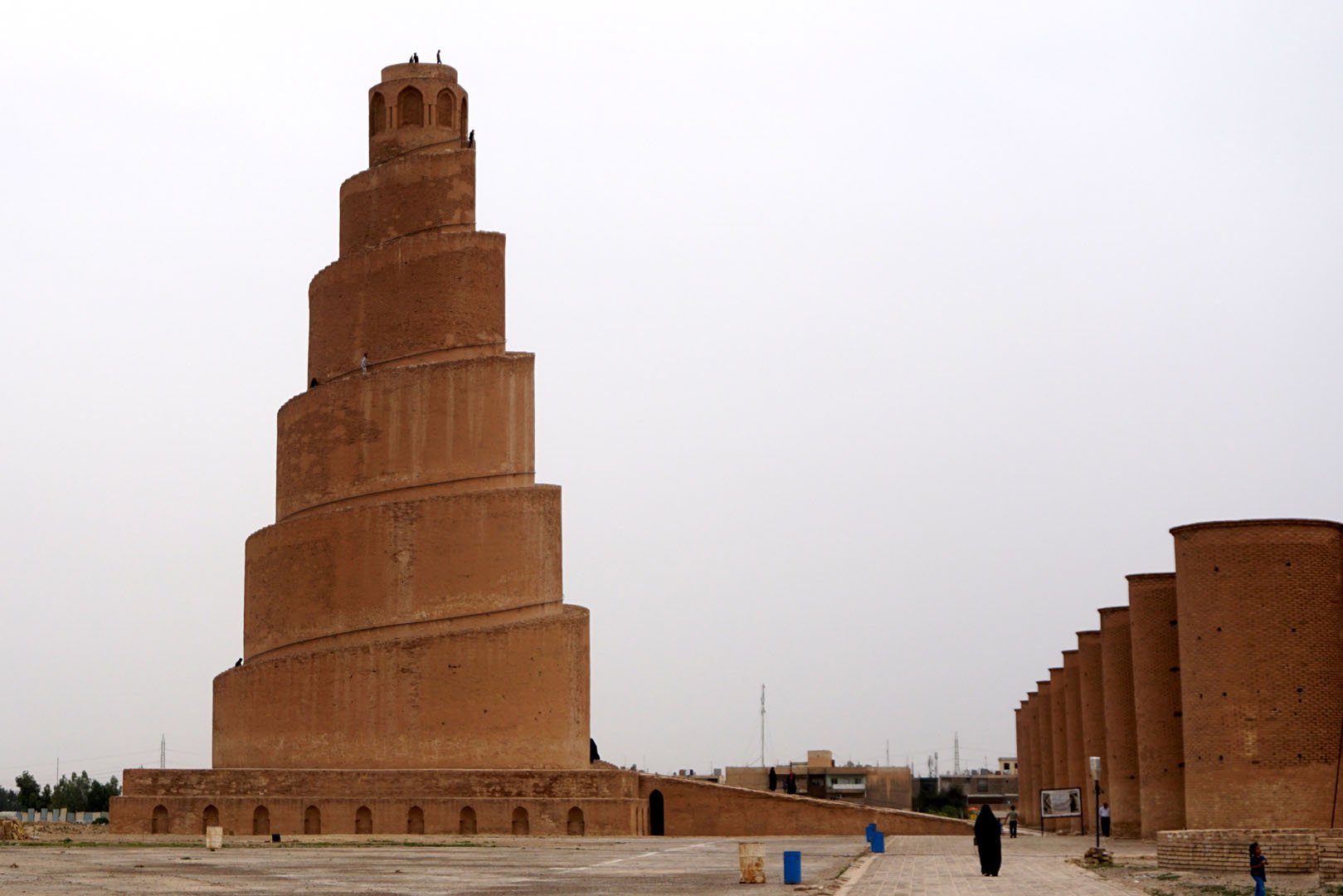
General info
Day 1 – Baghdad
- Arrival at Baghdad International Airport.
- Meet your local guide at the airport and transfer to the hotel.
- If there is time; get to know a bit more about Baghdad.
- Overnight stay in Baghad.
Day 2 – Baghdad
- National Museum.
- Al-Mustansariya School, this used to be the most important university in the Islamic world.
- Almutanabi Street, also known as Book Street.
- Copper market.
- Highlight : Al Shaheed Monument, an imposing structure commemorating the first Gulf War.
- Liberation Square, the central square of the city.
- Save the Iraqi Culture Monument
- Overnight stay in Baghdad.
Day 3 – Baghdad – Babylon – Karbala
- Drive to Babylon.
- Highlight : Tour of the ruins of Babylon, including the Hanging Gardens and the Tower of Babel.
- Palace of Saddam Hussein, on top of a hill overlooking Babylon.
- Drive to Karbala.
- Highlight : Imam Hussein Shrine, the place where Imam Hussein is buried.
- Al Abbas Mosque, the place where Abbas ibn Ali is buried.
- Drive to Baghdad.
Day 4 – Samarra – Baghdad
- Drive to Samarra, on the way we drive through villages that have been destroyed in the fight against IS.
- Highlight : See the Samarra Minaret (also known as the Great Mosque of Samarra). If you like you can walk to the top.
- See the famous Birka Palace.
- Return to Baghdad.
Day 5 – Baghdad
- Airport drop off.
- End of tour.
Culture Road
Fill in the form and we will get back to you
- Selected trip *
- Hidden Request URL *
- Full name *
- Nationality
- Hidden Language
- Yes, I want to receive CultureRoad’s amazing newsletter.
- Ja, ik ontvang graag de nieuwsbrief van CultureRoad.
- Comments This field is for validation purposes and should be left unchanged.

book a tour
contact form

Iraq and Kurdistan- between the Tigris and Euphrates – 15 days
history, culture, sightseeing
An exceptional expedition to the places considered to be the cradle of our civilisation. During the tour, we will visit the fascinating heritage sites of ancient Babylon and Assyria and newer ones – dating back to the Arab and Ottoman eras.
We will have an opportunity to see the cultural and religious diversity of Iraq, numerous branches of Christianity, Yazidis, and also Iraqi Sunni and Shia Muslims. We will visit little-known regions of the south Iraq. Furthermore, we will have an opportunity to admire the Ahwar Marshlands and we will take a boat tour along the Shatt al-Arab River. Moreover, we will see some absolutely enchanting mountain landscapes and, last but not least, we will get to know the very hospitable and friendly inhabitants of the Iraqi Kurdistan.
DAY 1 | Basra - Shatt Al.-Arab
Arrival at the Basra airport and transfer to the hotel. After short rest we will walk around Basra – a town whose history starts with the first caliphs. At those times, it was a harbour and an important military garrison. Although Basra suffered considerable destruction in the 20th and at the beginning of the 21st century, numerous monuments and structures dating back to the Ottoman era can be seen there. In the afternoon, to end our trip, a very special attraction – a motor boat sunset cruise along Shatt al-Arab, i.e. a river formed by the confluence of the Tigris and Euphrates Rivers, flowing into the Persian Gulf. Dinner and night rest at the hotel
DAY 2 | Ahwar - Ur - Nasiriyah
We will start the sightseeing in early morning. We will set off to the north. To start with, we will visit the unique Ahwar Marshlands. This is an area where people have lived from time immemorial. The culture and traditions of the local inhabitants are exceptional and include many elements from pre-Islamic times. In 2016, the marshland region and the culture of its inhabitants were entered into the UNESCO World Heritage List. After lunch, we will continue our journey to the ruins of legendary Ur. At the beginning, the ziggurat in Ur which might have been a model for the Biblical Tower of Babel. Then we will have a walk among the remainders of a town which was the birthplace of Abraham according to the Bible. In the evening, arrival in Nasiriyah. Dinner and night rest at the hotel.
DAY 3 | Uruk – Kufa – Najaf
In the early morning, we will set off from Nasiriyah to the site where ruins of the ancient Babylonian town of Uruk are located. Next we will go to Kufa, where we will visit the house of imam Ali (the son-in-law of the Prophet Muhammad). After lunch and a short walk around Kufa we will continue the drive to Najaf, the most important place for Shia Muslims apart from Karbala – a town and sanctuary. We will see (if possible) the place where Imam Ali, the most faithful companion of the Prophet Muhammad, the husband of the only daughter of the Prophet, Fatima, and the fourth caliph, was murdered. We will visit the sanctuary and the town. Dinner and night rest at our hotel.
DAY 4 | Karbala – Al Ukhaidiri
In the morning we will drive to the exceptionally well preserved remains of a fortress from the times of Abbasid caliphs, Al Ukhaidir. The fortress was finished in 775 AD but the history of this place dates back to much older times, which is indicated by numerous artefacts from the Sasanian and Parthian times. Next we will go to Karbala – a sacred place of Shia Muslims. The town was founded at the place of death of Imam Hussain ibn Ali – grandson of the Prophet Muhammad, killed at a battle in 680. It is the location of the most sacred Shia sanctuary that attracts thousands of pilgrims, not only from Iraq. Dinner and night rest at the hotel.
DAY 5 | Babylon – Ctesiphon – Baghdad
After breakfast, we will set off to see the ruins of the ancient Babylon Visiting the Babylon ruins – we will walk through the reconstructed Ishtar Gate and visit the museum. Another stop on our trip will be the Euphrates shore where one of the most impressive palaces of Saddam Hussein is located. Next we will go to capital of the Persian Parthian Empire – Ctesiphon. The ruins are located on the Tigris shore. Our sightseeing will include a visit to the remains of the palaces of the first rulers from the Sasanian Dynasty. Afterwards, we will go to the excavation site where the. In the afternoon, we will drive to Baghdad. Dinner at our hotel.
DAY 6 | Baghdad
From the morning, we will start visiting the fascinating city of Baghdad. At the beginning, we will see what is left from the formerly priceless and vast collection of the National Archaeological Museum of Iraq. In the afternoon, a drive through Baghdad – we will see some of the most important sites: the Freedom Square and the al-Shaheed Monument, also known as the Martyr’s Memorial – a memento of the Iran–Iraq War that lead to the fall of Iraq in 1980s. In the evening, transfer to the hotel, dinner and rest.
DAY 7 | Samarra – Malwiya – Minaret – Mosul
In the morning, we will set off to the one-day trip to Samarra – one of the oldest towns of Iraq. The most important sights will be the remaining structures of the Great Mosque of Samarra, with their most prominent “snail shell minaret”. Construction of the 33 m minaret was started in 848 and finished 851, in the times of Abbasid caliphs. In 2007, the Malwiya Minaret was entered into the UNESCO World Heritage List. After lunch, we will continue our journey to one of the most ancient city in Iraq – Mosul In the evening, transfer to the hotel, dinner and rest.
DAY 7 | Mosul
After breakfast, a full day tour of the city which was one of the capitals of the Ancient Assyrian. At the beginning, we will visit the Bash Tapia fortress, ruined in 1393 by the Tamerlane army. The fortress was rebuilt in the Ottoman times. Then we will go for a walk through the old town dolls of one of the oldest continuously inhabited cities in the Middle East. We will visit the Cathedral Al. Tahira and the Great Mosque Al. Nuri. Both facilities are under reconstruction as they were destroyed during the ISIS occupation of the city. Dinner and overnight in Mosul.
DAY 9 | Mosul – Lalish – Dahuk
In the morning we will depart for Dahuk. En route we will visit the Dayro d-Mor Mataya Orthodox monastery, one of the oldest monasteries in the Middle East. Next we will drive to the area of Gaugamela, the site of a famous battle between the army of Alexander the Great and the Persian forces of Darius III. That battle finally decided about the fate of the Achaemenid Empire. We will also see Jerwan where ruins of one of the oldest aqueducts are located. After the walk, we will have lunch at a traditional Kurdish restaurant. After the meal, we will depart for Lalish, one of the most important sanctuaries of Yazidis. It is the place where a tomb of the founder of the Yazidi religion, Sheikh Adi (1070-1162), is located. We will also have a walk through the nearby village and learn about the life of Yazidis. In the afternoon, we will depart for Dahuk. Dinner in restaurants.
DAY 10 | Dahuk – Zakho
Breakfast at the hotel. On this day, we will visit Al Quosh – a tomb of an Old Testament prophet living in the 7th century BC. Next we will go to the Mar Mekha Orthodox monastery dating back to the 3rd century and a large Rabban Hormizd Monastery which is a home for over 600 monks. In the mountains near the monastery there are still some hermitages where monks live. After the visit, we will go to the Syrian border to see Christian church on the edge of the Tigris river. We will able to see Syrian village. In Zakho we will see Dalal bridge which was built by Romans. In the afternoon, return to Dahuk.
DAY 11 | Amadiya - Mout Gera
In the morning, we will set off to visit Amadiya, a town founded by Assyrians. There is a fortress located 90 km from Dahuk, at 1,400 m above the sea level. We will admire the Bab Zebar gate and the remains of a fortress located at this exceptional site. We will also see an impressively tall minaret (more than 30 metres high) in Amadiya. The minaret and mosque were built by Sultan Hussein Wali. Moreover, we will see the synagogue and madrasa, founded more than 100 years ago by the University of Cairo. After lunch we will drive near Mount Gera, to see a former residence of Saddam Hussein. In the afternoon we will arrive in Erbil. Dinner and night rest at the hotel.
DAY 12 | Erbil
After breakfast, we will visit Erbil, one of the oldest towns of the world, with a documented history of more than 7000 years. To begin with, a citadel constructed on ruins of a Sumerian town called Urbellum or Arbella, which means “four gods”. The streets of Erbil were walked by Abraham, Alexander the Great and many other famous persons. While visiting the fortress, we will see a jewellery museum. Next we will go to a market where we will have lunch at a restaurant. After the meal, we will set off to visit the Choli minaret constructed in the 12th century only from bricks imported from Egypt. At the end, we will visit a monument to one of the most famous Kurdish poets and historians – Ibn al-Mustafi (1169-1239). Dinner in one of local restaurants.
DAY 13 | As Sulaymaniyah - Dokan
Breakfast at the hotel restaurant. Cable car ride to the parking lot. Next we will drive to As Sulaymaniyah. En route we will visit the town of Dokan where we will stop for lunch. In the afternoon, we will arrive in As Sulaymaniyah where we will see the famous Red House – a place of incarceration and tortures in the Saddam Hussein times. Next we will go to a market where we will visit a traditional tearoom. Dinner and night rest at the hotel.
DAY 14 |As Sulaymaniyah - Halabiyah - Ahmed Awa
We will start the sightseeing in As Sulaymaniyah in the morning from a visit in the Kurdistan museum where we will see collections from different historical eras, including the oldest artefacts from the beginnings of civilisation. After the visit at the museum, we will drive to Halabiyah – a town that fell victim to a gas attack on 16 March 1986. During the attack of the Iraqi army more than 5,000 people were killed, and 10,000 were injured and hospitalised. Despite its tragic past, the town is still inhabited – the Genocide Monument and Museum are currently located there. In the afternoon, we will set off for the mountain regions near the border with Iran. We will visit the Ahmed Awa Waterfalls, where we will have lunch in the mountain scenery. In the afternoon, return to As Sulaymaniyah. Dinner and night rest at our hotel.
DAY 15 | Ravanduz - Hamilton road- Erbil
In the morning we will depart for As Sulaymaniyah. After tree and half hours of drive we will visit spectacular Rawanduz canyon Then we will go along the old Hamilton Road. where we will be able to admire the unspoiled mountain scenery and the engineering skills of the builders of this road. We will stop on the way at the Gali Ali Big Waterfall. In the evening we will drive to Erbil. Transfer to the airport.
If the departure is on the next day, overnight stay in Erbil (not included in the price)
Practical information
Tour description.
- the length of the tour : 15 days in Iraq;
- start of the trip: Basra;
- end of the trip: Erbil;
- the highlights of this expedition: ancient architectural remains of the towns of Ur and Uruk, Babylon Samarra and Ctesiphon. A very important element of the tour will be the sightseeing of Baghdad and Shia sanctuaries in Najaf and Karbala. Another attractive feature of this tour will be the possibility to see the local natural sights and to admire beautiful mountain sceneries. The close encounter with the culture and traditions of Kurdistan inhabitants may prove an unforgettable experience.
The close encounter with the culture and traditions of Iraq inhabitants may prove an unforgettable experience.The tour will be a sightseeing trip to a Middle East area that is historically and culturally exceptional. It will be oriented on sightseeing and cultural tourism. Because of the special nature of the visited places and of the expedition features, the travellers should be able to participate in walking tours of towns and historic sites as well as in short hikes to vantage points or in motor boat cruises. Accommodation is planned in hotels and we will use passenger cars and minibuses for transfers. No long hikes or activities that require strenuous physical effort are planned during the tour. The itinerary was designed to enable best possible viewing of the places away from mass tourism routes, while meeting basic safety standards and ensuring comfort to the travellers. Bear in mind that Iraq and Kurdistan are mostly inhabited by Shia and Sunni Muslims, which means the need to respect cultural differences and adhering to the appropriate dress code.
Depending on the political situation, the length of the tour and the order of visited places may change. In a situation of a serious threat to travellers’ safety, the tour may be cancelled. We will keep you updated as to whether the expedition is possible.
Visas and documents
- Your passport must be valid for at least 6 months after the planned end of the tour.
- Visa can be obtained at the airport upon arrival for most for UK and European Union citizens. If you travel with a passport of a non-EU country, contact the BTP Adventure office
- You should take with you for the trip a photocopy of your passport (the photo page) and an additional ID document
Health and vaccination
- Before departure, we recommend a consultation with a family physician and a tropical medicine specialist.
- Vaccination against tetanus, diphtheria, viral hepatitis A and B and typhus is recommended.
- The risk of malaria is very low.
- We recommend visiting https://travelhealthpro.org.uk/countries .
- During our expedition, we will drink only bottled water. You should avoid ice in your beverages and eating raw or undercooked foods. Medical care is at a good level, especially in Baghdad. Medical services are provided for a fee.
- insect repellents
- high sun protection cream (recommended SPF 50)
- disinfectants, wound dressing materials
- analgesics and antipyretics
- anti-diarrhoeals, electrolytes and vitamins
Insurance is not covered by the tour price. Having valid insurance is a condition for taking part in the trip. We recommend taking out insurance that will be appropriate for the planned itinerary and for your individual state of health and needs. Please send us the proof of your insurance contract.
You can purchase insurance on your own on the website of Axa or any other insurance company: https://www.axa.co.uk/travel-insurance/ .
BTP Adventure may help you obtain adequate insurance cover. If you want our help, please contact us.
- The Republic of Iraq is a country characterized by political instability and a major risk of an armed conflict. For the time being, actual terrorist threat and armed conflict risk exist in this country. We design our itineraries so as to avoid places that are potentially most dangerous (some districts of Baghdad and towns where armed struggles continue).
- Despite the difficult situation, expeditions to southern Iraq are possible and conducted with the adequate precautions.
- The Iraqi Kurdistan territory, although officially belongs to Iraq, is in fact a separate country. Except for the regions at the border with Turkey and Syria, it is a very calm and safe area. The actual terrorist threat or armed conflict risk is nowadays low. We design our itineraries so as to avoid places that are potentially dangerous (border regions)
- Owing to the good relations we have with local contractors, we keep following the news to be aware of any potential threats and safety risks. We also recommend you to read the latest news on the Foreign & Commonwealth Office website: https://www.gov.uk/foreign-travel-advice .
- During the tour, please take seriously the instructions of our contractors, guides and tour leader.
- It is very important to respect local customs and abide by local laws and regulations. You will receive the necessary information on an on-going-basis from your local guides and the tour leader.
- It is strictly prohibited to take photos and make video recordings at military and police installations and at airports. You are also not allowed to take photos where people in military/police uniforms are present!!!
- Photographing people is possible only when they expressly agree to it. Taking pictures when the subjects have not allowed it often ends up with escalating aggressive behaviours.
The legal tender in the Republic of Iraq is the Iraqi dinar. Currency exchange is possible at the Basra airport, in most towns, in banks, in authorised foreign exchange points and in hotels. Using payment cards is possible in hotels and in some shops and restaurants. The best foreign exchange rate is for US dollars and euros.Prices in restaurants, hotels or shops are given in US dollars. It is advisable for you to take dollars in small denominations or 100-dollar bank notes issued after 2006.
For current foreign exchange rates see www.xe.com or install xe.com on your phone.
The official language in south Iraq is Arabic, in the Iraqi Kurdistan is Kurdish. The command of English and German, especially among restaurant or hotel employees, is satisfactory. For self-guided tours, you must speak Arabic, while English-speaking travellers must hire a local guide with a command of English.
Customs, culture, religion
Iraq is a multi-ethnic and multi-religious country. The southern part of Iraq is mostly inhabited by Shia Muslims. We will also visit Sunni regions. Because of cultural considerations and for safety reasons, it is advisable to learn about the recommended dress code. Visiting places of worship, especially sanctuaries in Najaf and Karbala, is possible only to a limited extent.
Women do not have to wear headscarves. When visiting some mosques and other places of worship, women may be asked to put on a chador that may be borrowed free-of-charge at the entrance to the building. You should bear in mind that there are considerable differences between the conservative province and relatively liberal large towns.
Men are not allowed to wear shorts. During official encounters, women do not give their hand to a man, and men do not give their hand to a woman. This custom is still observed in the province but is increasingly abandoned in large towns. Discussions about political subjects should be avoided. Iraqi people are curious about the world and tourists and are ready to take up such conversations.
The Iraqi Kurdistan is a multi-ethnic and multi-religious area. Most of the inhabitants are Sunni Muslims. Moreover, there are Christians of different Eastern rites and also Zoroastrians and Yazidis living in Kurdistan. Women do not have to wear headscarves. Kurdistan inhabitants have a very liberal attitude toward religious imperatives.
It is very important to respect local customs and abide by local laws. You will receive the relevant information from your local guide or the tour leader.
The tour dates are proposed in periods of the best possible weather conditions at the sites included in the itinerary. The best time for expeditions to Iraq is the period between September and the end of March.
- South Iraq temperatures rarely exceed +30°C during the day and may fall to about +12°C at night. Rainfalls may occur occasionally and are usually transient. High density of dust particles is a major issue. Sandstorms may appear. In the southern regions – Basra – the air is very humid which increases the sensation of heat.
- Kurdistan temperatures exceed +25°C during the day and +10°C at night. They may fall to +5°C in the mountain regions. Rainfalls may appear only very rarely during the planned time of the tour.
For detailed information see https://www.meteoblue.com/en .
Communication, Wi-Fi, electricity
There is mobile network coverage practically in the majority of areas included in our itinerary. It is possible to purchase a local SIM-card with an Internet package at the airport or in Baghdad. Before the trip, please enquire with your mobile network operator whether they have a contract signed with operators in Iraq and what the prices of call and SMS roaming are. To avoid a nasty surprise, we recommend disabling mobile data usage.
- Wi-Fi is available at most hotels and restaurants.
- Additionally, we recommend taking a capacious power bank.
- Power sockets of type C, D and G. Voltage 220 V, frequency 50 Hz.

Useful equipment
For climatic and cultural reasons, loose garments will be most appropriate: long trousers, long skirts, long-sleeved shirts, which can be easily washed and will quickly dry. The most comfortable footwear for the tour will be lightweight boots. Palladium brand boots are recommended. Wearing open sandals is possible. Hiking boots are not necessary. The following are worth taking:
- sachet for documents and money
- wet wipes for body cleaning and antibacterial gels
- polar fleece jacket or warmer blouse, especially useful at evening and night times
- head cover and sunglasses – mandatory, the sun is no joke!
- comfortable summer clothes, useful during practically the whole trip
- light T-shirts/shirts
- useful odds and ends: torch, Swiss Army knife, sewing kit (usually is not needed but is not heavy and does not take much place), chargers, mug (for special occasions); inflatable neck pillow, useful on the plane and during car rides; small wallet for the local currency; books to pass the time on flights and car rides
Price: £ 45 90 p/p
During the expedition, we will travel by passenger cars or minibuses. Depending on the daily agenda in the itinerary and the current situation as regards traveller safety, we will spend 4 to 8 hours travelling every day. Speed depends on the road surface conditions, terrain characteristics and number and length of stops. Moreover, our itinerary includes motor boat cruises on Ahwar Marshlands in the southern region of Iraq and a voyage on a small cruise ship on the Shatt Al-Arab River.
Accommodation
We are not able to guarantee a uniform accommodation standard at each of the planned sites during the stay in Iraq. Our priorities are your comfort, safety and appropriate location. We always place emphasis on the support of local community when selecting the sites for our accommodation. In general, rooms will be assigned on the assumption of two people sharing a twin room (rooms with individual bathrooms). The surcharges for single rooms are quoted in the “Price” section.
- Two overnight stays in 4-star hotels are planned during the trip.
Meals are included in the tour price, as specified in the itinerary. B – breakfast, L – lunch, D – dinner. Breakfasts will be usually offered in hotels. We will go for lunches and dinners to local restaurants. The cuisine of southern Iraq is a typical for Middle East – very tasty and varied. For information about the local costs of living see https://www.numbeo.com/cost-of-living/ .
Services of local guides and security guards – if necessary
Entrance fees and permit charges
Admission tickets for the visited sites and national parks
Trip preparation
Trip preparation, visa mediation, the invitation (if it is would be necessary) to obtain a visa
Main flight
Costs of the main flight to and from Iraq
Costs of flight tickets are not covered by the tour price. BTP Adventure does not directly arrange and buy tickets for international flights. However, we may suggest the best connections and airlines. For this purpose, contact us by e-mail or call us.
Iraqi visa cost for UK and UE citizen is 75 USD
Travel isurance
Expedition participants should arrange insurance on their own.
Travel insurance
The price does not includes the cost of tips and porters’ fees.
Additional meals and drinks
Meals other than those listed in the final itinerary.
Personal expenses
Personal expenses and souvenirs.
Surcharge for a single room: 550 £
Additional accommodation
supplementary payment for the additional accommodation In the case of arrival or departure on a different date,

FINAL NOTES
We will keep updating the detailed information on the safety and final itinerary of the tour. Before you decide to submit the booking form, please learn about the current political and sanitary situation in Iraq and Kurdistan.
It is possible to organize an individual trip without a tourguide, please contact the office.
Trip to Iran can be combined with trips to Iran and Pakistan If you are interested, please contact the office.
The planned expedition is an exclusive proposal prepared on the basis of our experience and knowledge of the local peculiarities and major sightseeing attractions of Iraq and Kurdistan.
We are committed to ensure the best possible and safe and, as far as feasible, comfortable travelling through this little-frequented and extremely interesting country with a fascinating history.
With any questions please contact BTP ADVENTURE.
It is possible to shorten the tour to two options
- South Iraq 9 days from Basra to Mosul.
- Iraqi Kurdistan 9 days start and end in the city of Erbil
If you are interested, please contact the office to arrange the route and the price of the trip.
Trip to Iran can be combined with trips to Iran or Pakistan and . If you are interested, please contact the office.
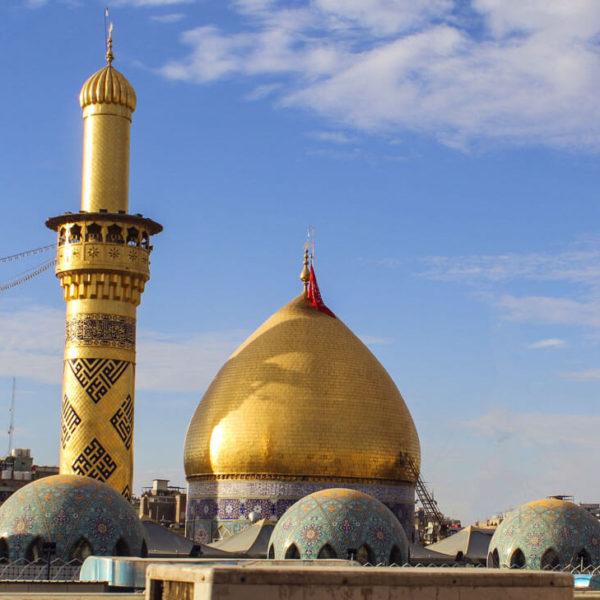
See orher tours

Central African Republic 10 days – the Green Heart of Africa,

Guinea, Liberia, Sierra Leone – 14 days

Libya – the jewel of North Africa – 7 days

Malawi, Zambia and the Democratic Republic of the Congo – 12/16 days

Yemen – Socotra Island 8 days

Turkmenistan – Legends of the Silk Road, – 8 days

Tajikistan – a Country of a Thousand Lakes – 12 days

The Democratic Republic of the Congo & Republic of the Congo – the Heart of Africa -15 days

Angola – Unexplored Africa – 10 days

Ghana, Benin, Togo – 12 days

Senegal Gambia Guinea-Bissau – the Gateway to Africa – 12/16 days

Iran – north-western part – 14 days

Iran – south-east – 10 days

Iran – Persian Classic – 12 days

Cameroon – Colours of Africa, 16 days

Ivory Coast – 8 days

Nigeria – African Kaleidoscope – 12 days

Mauritania and Western Sahara – 9 days

Pakistan – a land of fairy tales on the roof of the world 14 days

Pakistan – Unknown History, 15 days

Uganda, Rwanda,Burundi, Democratic Republic of the Congo – Pearls of Africa, 14 days

Niger – Gerewol Festival 2024 – 11 days

Eritrea 7 days

South Sudan The Youngest Country of Africa – 12 days

Somalia – Mogadishu- 3 days

Niger – Mysteries of the Sahara 15 days

Djibouti-Somaliland – 9 days

Afghanistan – 10 days
- Destinations
- Create your own trip
- Book a tour
- Cooperation

RJ Travel LLC » Travel Agency & Tour Operator
Re-writing the concept of tourism and taking you on adventure tours to Iraq, Morocco, Afghanistan, Yemen, Persia, Lebanon, Saudi, Libya, Uzbekistan.
- Adventure tours
- Attractions
Ancient city of Babylon in Iraq
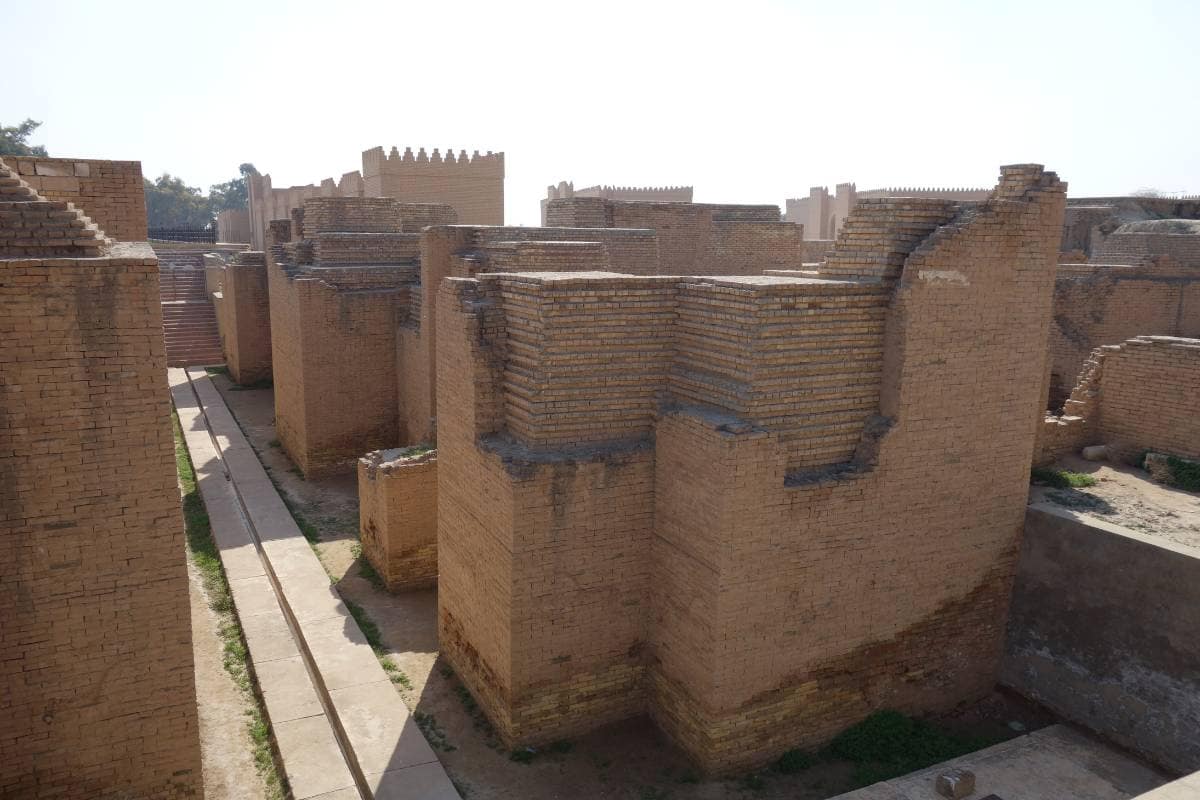
Table of Contents
The ancient city of Babylon , located in present-day Iraq, is a must-see destination for history and archaeology enthusiasts. You can travel to Babylon, a city founded in 1894 BC, and a place that was one of the most influential cities of the ancient world, serving as the capital of the Babylonian Empire.
When you visit Babylon city Iraq, you can explore the remains of the famous Hanging Gardens, one of the Seven Wonders of the Ancient World , as well as the impressive ruins of the palace of King Nebuchadnezzar II . The city also features the Etemenanki Ziggurat, a massive terraced structure thought to have been a temple dedicated to the god Marduk . Our Iraq tours departing from Baghdad offer the opportunity to immerse yourself in the rich history and culture of the fascinating Babylon ancient city.
” The Babylonian Empire was the most powerful state in the ancient world after the fall of the Assyrian empire (612 BCE). “
Curiosites about Babylon.
- The ancient city of Babylon location is in present-day Iraq and was founded and built in 1894 BC.
- Babylon the city served as the capital of the Babylonian Empire and was one of the most influential empires of the ancient world.
- The Hanging Gardens of Babylon, one of the Seven Wonders of the Ancient World, was located in the city.
- The palace of King Nebuchadnezzar II who ruled the Babylonian Empire during its height of power, is a prominent feature of the city’s ruins.
- The Etemenanki Ziggurat is a massive terraced structure and is thought to have been a temple dedicated to the god Marduk.
- The largest city of the ancient world was known for its impressive architecture including the use of baked brick and the development of the arch.
- Iraq’s ancient city was also known for its impressive irrigation systems and agricultural innovations.
- Babel was captured and destroyed by the Persian king Cyrus the Great in 539 BC.
- In the 19th century the ruins of Babylon were rediscovered by the British archaeologist Austen Henry Layard.
- Today, the ancient city of Babylon is a UNESCO World Heritage Site and a popular tourist destination.
- You can make an Iraq visa on arrival and visit Babylon .
- You can make a Babylon day trip from Baghdad , or visit Babylon while booking one of our tours.
Visit Babylon
The Hanging Gardens in Babylon is one of the seven wonders of the ancient world. It was a beautiful garden that was built on top of a tall building. The garden was full of different kinds of plants and flowers, and it had a system of water channels that watered the plants. People say that it was so beautiful that it looked like a green mountain in the middle of the city.
The Ishtar Gate in Babylon was the main entrance to the city of Babel in Iraq. It was decorated with blue and yellow tiles and it had pictures of different animals and gods on it. The Ishtar Gate was so big and beautiful that it made people feel like they were entering a special place. It was so impressive that even today, it still stands as one of the most visited tourist attractions.
The Processional Way in Babylon was a long road that led from the city gates to the temple of Marduk. It was lined with statues of lions and dragons, and it was used for special ceremonies and festivals. People would walk down the road to the temple to honor the god Marduk. The Processional Way was a grandiose road, that made people feel like they were part of something special.
The Temple of Marduk in Babylon was the most important temple. It was the home of the god Marduk, who was the most important god in the city. The temple was very big and had many rooms. The Temple of Marduk was decorated with gold and jewels, and it had a big statue of Marduk inside. This temple was where people would come to pray and make offerings to the god. It was considered the heart of the city, and the center of all religious activities.
The Palace of Nebuchadnezzar II in Babylon was the home of the king. It was a very big palace with many rooms and courtyards. It had a beautiful garden and a big throne room where the king would meet with his advisors. The Palace of Nebuchadnezzar II was an impressive palace, where people would marvel at the grandeur and luxury in which the king lived. A place that truly represented the power and wealth of the king and the city.
The Lion of Babylon
Discovering the mighty Lion of Babylon, the Iconic monument of the ancient city of Iraq.
The Lion of Babylon is a statue located in Babylon the ancient city. It is a large sculpture of a lion that stands on top of a stone platform. The statue is believed to have been built during the reign of King Nebuchadnezzar II, who ruled Babylon from 605 to 562 BCE. The statue represents the strength and power of the king and the city. It is one of the most iconic and recognizable symbols of the ancient city and is a popular place for visitors to take photographs with.
Map of Babylon
- Marduk Gate : Ceremonial entrance to the inner sanctum of the Temple of Marduk.
- Ziggurat of Etemenanki : Massive stepped pyramid dedicated to the god Marduk.
- Temple of Ishtar of Akkad : Dedicated to the goddess Ishtar, who was the patron goddess of Babylon.
- Southern Palace : Complex built by Nebuchadnezzar II, which served as the main residence of the king.
- Ishtar Gate : Main entrance to the city and was decorated with intricate tile work depicting various animals and gods.
- Northern Palace : Complex located in the northern section.
- Processional Way : Roadway lined with statues leading from the city gates to the Temple of Marduk.
- Esagila : Massive temple dedicated to the god Marduk, which served as the religious and cultural center.
- Moat Wall of Nebuchadnezzar II : Defensive wall built by the king to protect the city from invaders.
- Nimetti-Enlil : Temple dedicated to the god Enlil, who was the god of wind and storms.
- Imgur-Enlil : Temple complex dedicated to the god Enlil and was one of the most important religious sites.
- Enlil Gate : Ceremonial entrance to the Temple of Enlil.
- King’s Gate : Grand entrance to the palace complex of Nebuchadnezzar II.
- Zababa Gate : Ceremonial entrance to the Temple of Zababa, the god of war.
- Outer City Wall of Nebuchadnezzar II : Defensive fortification built by the king to protect the city.
Babylon the city – Available tours
Photos of babylon.
Our Story
Rocky road travel, rocky road blog, all destinations, afghanistan, afghanistan tours, mauritania tours, south sudan, south sudan tours, socotra tours, syria tours, pakistan tours.

Iraq Tour Itineraries
2024 / 2025
The world’s leading Iraq travel specialist. Join us throughout the year where we explore the “Land between two rivers” – Mesopotamia.
Share this page:
Iraq is open and welcoming tourists once again. We have tours to Iraqi Kurdistan in the north and Baghdad and beyond in the south.
All tours start and finish in either Baghdad, Basra or Erbil. All three have major airports which can easily be reached from Turkey or the Gulf.
There is an abundance of incredible and untouched history waiting to be seen. All our Iraq Tours are confirmed departures. Unsure of where you want to go? Check out our Map and FAQs below.
Tour dates don’t work? No worries, let us know when you want to travel and we will create a private tour for you .
Entire Iraq!
From Erbil – Duhok – Sulaymaniyah – Samara – Baghdad – Karbala – Najaf – Babylon – Basra & everywhere in between.
See our group Iraq tour itineraries below. Get in touch for a private tour quote.
Baghdad, IQ
Iraqi Kurdistan is visa on arrival for most European countries as well as the US, Canada, Australia, NZ, Japan, Brazil & more .
For Southern Iraq a new visa on arrival scheme has been announced for citizens of the EU, UK, US, Canada, Australia, New Zealand, Switzerland, Russia, China Japan & South Korea. If you are not from one of these countries then we will apply for a visa on your behalf. An invitation letter is issued and you can also get the visa on arrival.
Tour Itineraries

Itinerary Summer 2024
Overland from Baghdad to Erbil via Babylon, Karbala, Najaf, Nasariyah, Samarra and Mosul!
- May 11 - 18th, 2024

Our classic Iraqi Kurdistan tour with added swimming spots!
- May 19 - 25th, 2024
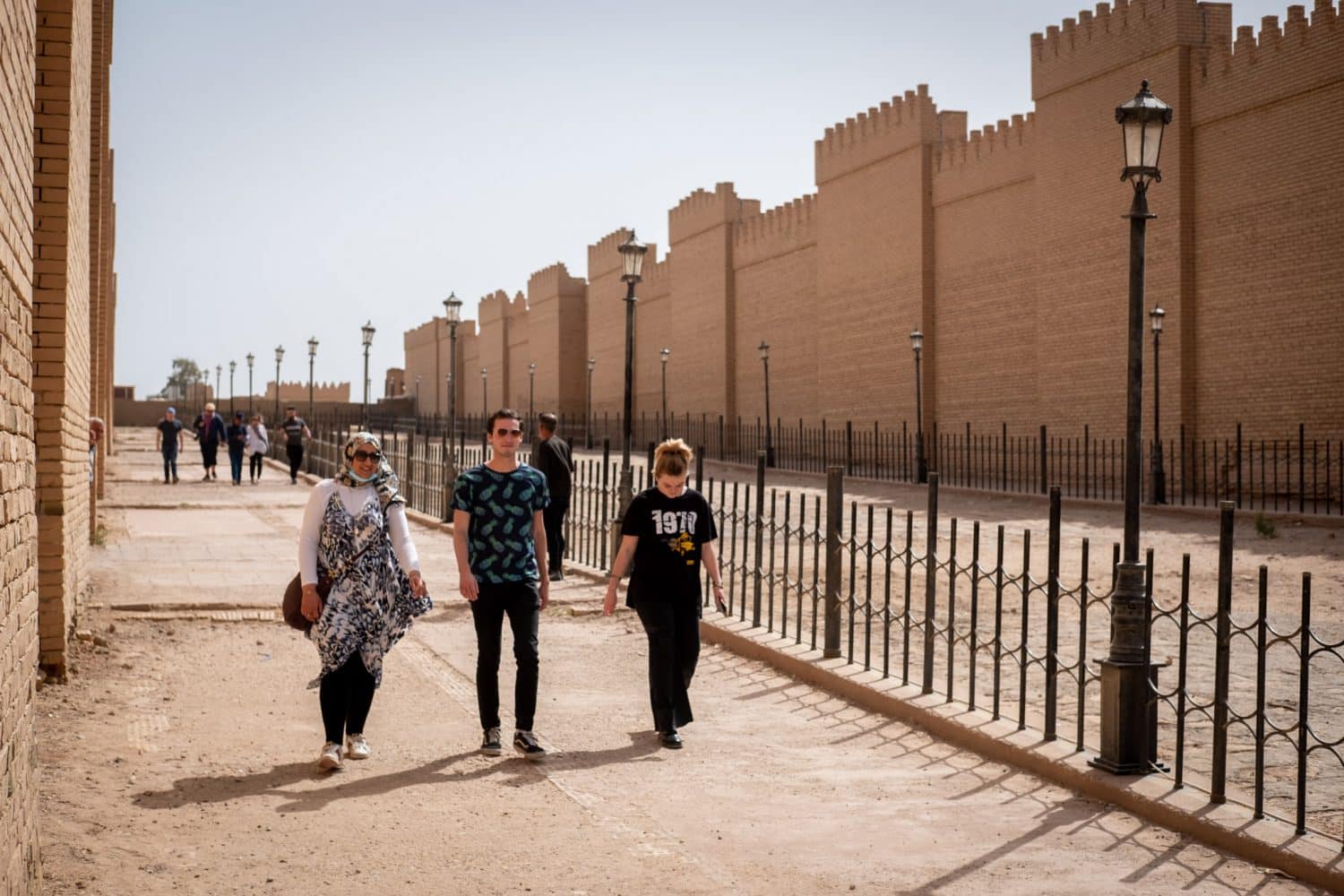
Our classic Entire Iraq tour from Baghdad to Erbil with two full weeks exploring ancient Mesopotamia!
- May 11 - 25th, 2024

Itinerary Autumn 2024
Overland all the way from the southern city of Basra to the Kurdish capital of Erbil.
- Sept 24 - Oct 2nd, 2024

Visit Kurdistan during the Yazidi Autumn Assembly Festival!
- Oct 2 - 8th, 2024

It’s a big one! All of Iraq – from Basra to Erbil and everything in between.
- Sept 24 - Oct 8th, 2024

Itinerary November 2024
Travel north from Basra city all the way to Baghdad!
- Nov 3 - 8th, 2024

Itinerary December 2024
It’s our Baghdad to Erbil classic arriving in the Kurdish capital on new years eve!
- Dec 26 - Jan 1st, 2025
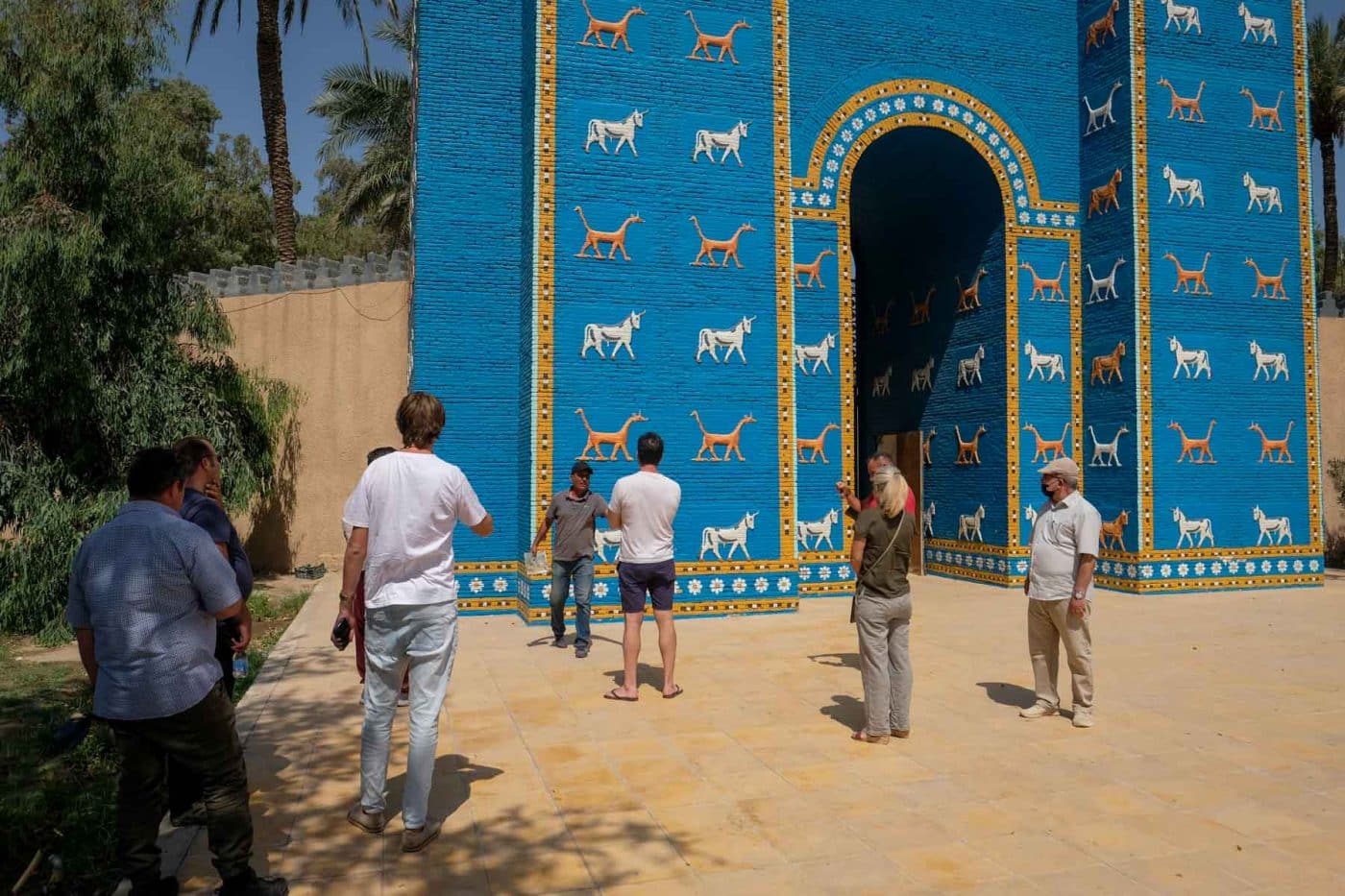
Itinerary March 2025
It’s our Baghdad to Erbil classic reaching Kurdistan in time for new year celebrations!
- March 7 - 15th, 2025

Itinerary Spring 2025
We cover every corner of Northern Iraq as we celebrate the new years festival of Nowruz.
- Mar 15 - 21st, 2025

It’s our favorite Iraq tour of the year – See the whole country and the iconic Nowruz fire show!
- March 7 - 21st, 2025
Create your own Iraq Tour
If our scheduled group tours don’t suit then we can create your own tour on your own dates.
The tours are all inclusive of accommodation in standard hotels, breakfast, private transport, entrance fees, permits, guiding and translations. Excluded are international flights, most meals, visa fees, tips & insurance.
Southern Iraq tours are not open to Israeli passport holders or those with evidence of visiting Israel in their passports. Iraqi Kurdistan is the exception for this.
Some parts of Iraq are deemed unsafe to visit. We research and meticulously plan our itineraries based on advice from our partners in Baghdad. All places on our itineraries are safe to visit.
Sample Itinerary
Day 1 - baghdad.
- Arrival in Baghdad. Your tour guide will meet you in Baghdad Airport.
- Introductory briefing on travelling in Iraq and a breakdown of the itinerary
- Baghdad tour – See the Liberation Square monument , which commemorates the establishment of the Republic of Iraq.
- Visit to the National Museum of Iraq . Reopened in 2015 after notorious looting during the war, it contains various treasure from the Mesopotamian and Babylonian periods.
- Visit the incredible and well renovated Al–Mustansariya School. This is commonly known as the oldest school in the world.
- Walk through the book market and adjoining copper market . A great place for souvenirs and photography.
- Visit the Al-Shaheed (Martyr) Monument.
- Traditional Fish Masgouf dinner and overnight in Baghdad.
Day 2 - Baghdad & Ctesiphon
- After breakfast it’s another full Baghdad city tour starting with a visit to the Save Iraqi Culture Monument and see the Green Zone of Baghdad.
- Visit the Al-Yassin Shrine arguably Baghdad’s finest.
- Stroll along the Tigris River and see the famous old clock tower and Abbasid Palace.
- Lunch in a traditional Baghdadi restaurant.
- Drive out to one of the greatest historical sites in the Middle East: the ruins of Ctesiphon . These days all that’s left is a gigantic arch which also happens to be the world’s largest span of unreinforced brickwork.
- Dinner and overnight in Baghdad.
Day 3 - Karbala & Samarra
- Up early for the drive to Samarra. Pass through multiple militia checkpoints along the route driving by many villages destroyed during the fighting against ISIS
- Visit the incredible Great Mosque of Samarra and it’s iconic spiral minaret. Climb all the way to the top if you dare!
- Drive back south onto the holy city of Karbala, just in time to catch the historic shrines at sunset.
- Dinner and overnight in Karbala.
Day 4 - Karbala and Babylon
- After breakfast we visit Karbala’s famous Al Abbas mosque and Iman Husayn shrine
- Drive to Babylon . You’ll tour the ancient ruins with our local expert and what’s left of the hanging gardens.
- Explore the looted ruins of Saddam Hussein’s former palace – perched on top of the ancient city
- After extensively exploring Babylon, continue onto Najaf. Visit the most important site of Najaf – the Imam Ali shrine for the daily late night ceremony.
- Dinner and overnight in Najaf.
Day 5 - Najaf, Nasiriyah and Ur
- In the morning we’ll drive to visit the tomb of the prophet Ezekiel in the city of Al Kifl.
- Najaf, including Imam Ali’s house (the very spot where imam Ali was killed) and the Imam Ali Shrine itself.
- Visit the Wadi-Us-Salaam – the world’s largest graveyard. It is said to contain tens of millions of bodies. Many shiites request to be buried here in one of the numerous catacombs.
- Leave Najaf and drive south to visit the Ziggurat of Ur , a neo-Sumerian construction built in 2000 BC. This used to be the capital of Mesopotamia during the Sumerian time and it is a UNESCO world heritage site since 2016.
- Drive to Nasariyah city and overnight.
Day 6 - Mesopotamian Marshes and Basra
- Up super early for sunrise in Mesopotamian Marshes! We’ll take a boat trip through the maze of marshes stopping by local villages for tea. The marshes once engulfed a whole swathe of Southern Iraq with numerous floating villages. Today the receding waters have led most families to change their livelihood but we’ll still see the few that remain.
- It is also home to the Maʻdān population who over the centuries have adapted to life on the water. Stop by a traditional house for lunch and tea.
- Tour the local market of Chibayesh and have lunch in a traditional reed house.
- Drive south towards Basra , the largest city in Southern Iraq and the country’s only seaport.
- Visit the Ashar and Shanashil Al Basra area to witness the old Basra – old style merchant houses with balconies leaning over the narrow streets. Stop by the Souq, History Museum, Saddam Hussein Palace (of course) and the Central Railway Station.
- Dinner and overnight in Basra.
Day 7 - Basra
- Airport transfer & end of tour.

Iraq blog

What are the differences between Iraqi Kurdistan and Iraq?
Iraqi Kurdistan vs Federal Iraq Iraq is a complicated place. Sectarian divisions have long characterised the country, be that between the various factions of Islam

Is it safe to travel to Iraq as a tourist?
Tourism in Iraq The image that Iraq usually conjures is one of fighting, unrest and turmoil — but slowly, that is changing. Life is returning

Travel to the Great Mosque of Samarra
How To Travel to the Great Mosque of Samarra The Great Mosque of Samarra is not the easiest place to get to in Iraq –
Iraq Tours - FAQs
Most frequent questions and answers for our tours in iraq..
Iraqi Kurdistan has always been generally safe as it has separate borders with the rest of the country. It is protected by the foreign aided fighting force – the Peshmerga.
Southern Iraq has recently become safe to visit . Since the fall of ISIS we have led successful research tours and organized numerous group tours there without issue.
Passports from the EU, US, Canada, Australia, New Zealand, Japan, Brazil and others are visa free for 15 days in Iraqi Kurdistan. Passports from other countries can apply for a visa through our partners for an extra cost.
Iraq has now introduced a visa on arrival scheme for citizens of the EU, UK, US, Canada, Australia, New Zealand, Switzerland, Russia, China Japan & South Korea. If you are not from one of these countries then we will apply for a visa on your behalf. An invitation letter is issued and you can bring this to your local embassy to apply for the visa.
Travel insurance is a must. We have teamed up with IATI Travel Insurance because they provide cover for all our destinations. You’ll also automatically receive a 5% discount with them as a Rocky Road Travel customer.
For flights into Erbil and Baghdad, the main gateways are Istanbul and Dubai.
USD and Euro are both accepted in currency exchanges. Make sure to bring cash.
Our groups are capped at 10 people for added flexibility and comfort.
Get in Touch

📞 +491635158517 ✉️ [email protected]
Destinations
- Afghanistan
- North Korea
- Papua New Guinea
- South Sudan
- Agents & Partners
- Terms & Conditions
- Privacy Policy
- Sustainability
- Travel Insurance
Subscribe To Our Newsletter
Keep in touch with the latest news and info on our unique destinations.

Get in touch
Request more info or book a tour.
Fill in the form and we’ll get back to you in no time!
- Destinations
- Testimonials
We do the planning for your iraq tours
Let's Explore Iraq with Safraty!

Our Background
Welcome to our travel agency in Iraq, founded in late 2020 by the passionate couple, Ahmed and Aya. With a deep love for their country's rich history, breathtaking landscapes, and diverse cultural heritage, they embarked on a mission to introduce foreign tourists to the wonders of Iraq. Our team is dedicated to providing exceptional Iraq tours travel experiences, showcasing the hidden gems and ancient treasures that make Iraq a captivating destination. Whether you're interested in exploring the ancient ruins of Babylon, wandering through the bustling bazaars of Baghdad, or marveling at the natural beauty of the Kurdistan region, we are here to curate unforgettable journeys tailored to your interests and preferences. Come join us on an adventure of a lifetime and discover the enchanting beauty of Iraq through our expertly guided tours.

Our Services
Discover Iraq's enchanting wonders with our tour operator. Choose between private tours for a personalized experience or join our group excursions to connect with fellow travelers. We assist with Iraq and Kurdistan visas, offer hotel bookings, and provide reliable airport pick-up and drop-off services. Our dedicated team ensures a seamless and unforgettable journey, allowing you to immerse yourself in the beauty, history, and culture of Iraq. Embark on a remarkable adventure and let us handle the logistics while you create lifelong memories in this captivating destination.
Sign up to hear from us about specials, sales, and events.
Copyright © 2024 Safraty - All Rights Reserved.
Powered by GoDaddy
This website uses cookies.
We use cookies to analyze website traffic and optimize your website experience. By accepting our use of cookies, your data will be aggregated with all other user data.
Federal Iraq Tours
Join one of our tours in iraq.
After several decades of being isolated from the rest of the world, Iraq is finally gaining much-needed peace and stability, allowing travelers to discover the remains of Ancient Mesopotamia, as well as mesmerizing religious sites such as Karbala, or to experience a real cultural immersion in the Arab Marshes.
From Samarra to Babylon and Ur, our tours in Iraq are heavily focused on both historical and cultural Iraq but what makes us unique is that they also emphasize Iraq’s unfortunate contemporary history and the legacy of ISIS, which is still visible in the northern part of the country.
We have scheduled group expeditions for Iraq all year long, plus we can also organize any sort of private, tailored adventure.
what travelers say about us

Need to know for your Iraq tour
How to get a visa.
There is a visa on arrival available at Baghdad International Airport. It costs $75.
Is it safe?
The situation is getting better by the day, plus we will be traveling with a group of local experts who know the latest security updates.
Which nationalities can join our Iraq tours?
Basically, all nationalities which are eligible to the visa on arrival. See FAQ.
Our scheduled group tours for Iraq
From Basra to Erbil, our Iraq tours cover the entire country, including the region of Kurdistan.
Most of our scheduled tours in Iraq are 8 or 9-day trips, usually composed of 12 people.
Our tours for Iraqi Kurdistan are also 1-week long, and we tend to schedule them, so you can combine both Iraq and Kurdistan in a 2-week long tour!
Upcoming Iraq Tours
These are all our upcoming tours to Iraq (including Kurdistan region)
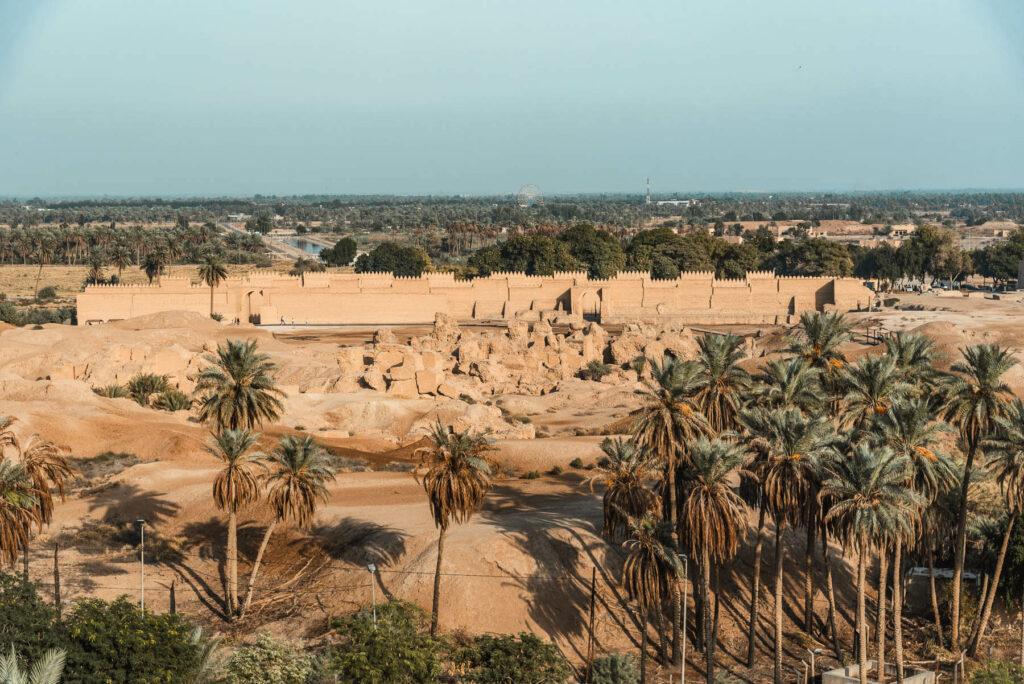
Federal Iraq classic itinerary
From Mesopotamian Marshes to Karbala, Babylon, Baghdad and Mosul, this is one of the most sought tours we offer
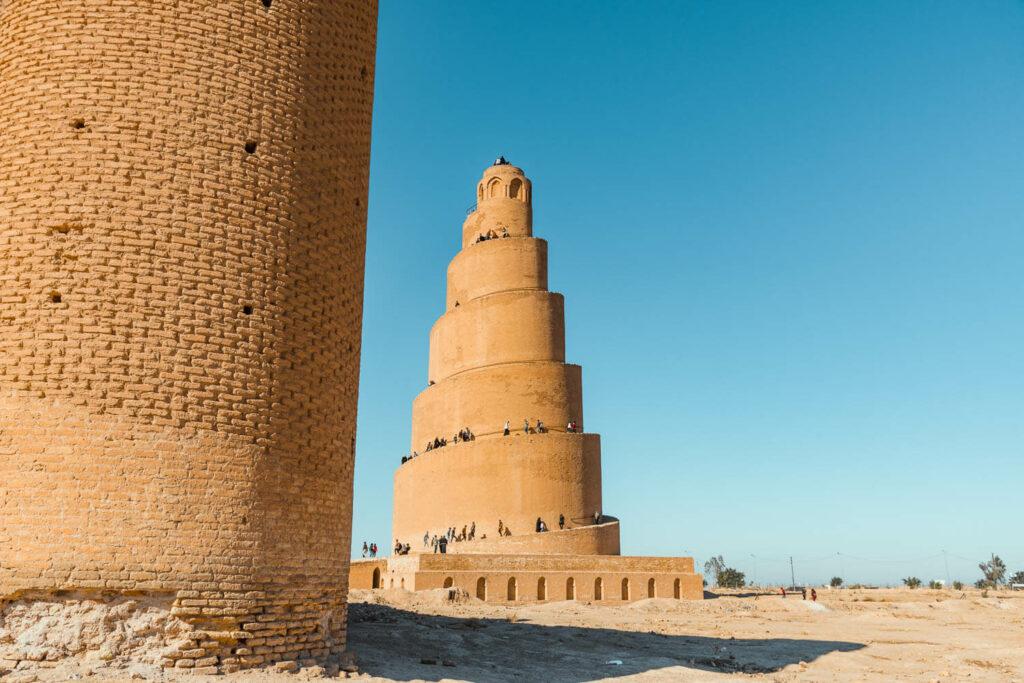
Full Iraq Round 2: Federal Iraq + Kurdistan
Here’s an extended version of our Iraq tour, which also includes Kurdistan
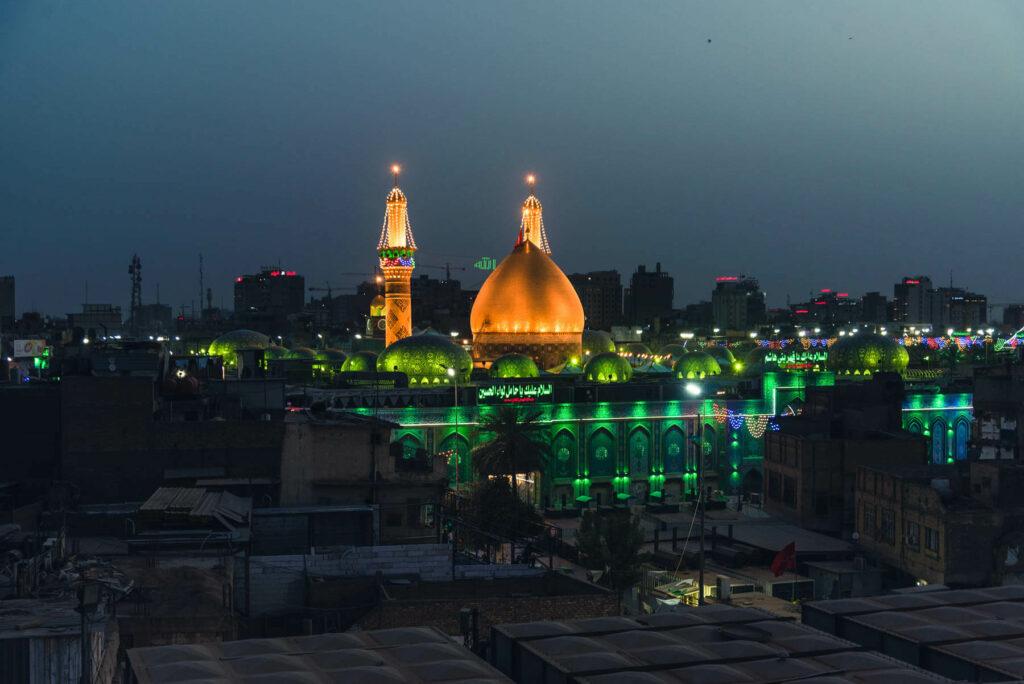
Full Iraq with Fallujah
Here’s an extended version of our Iraq tour, which also includes Fallujah, Basra and Kurdistan
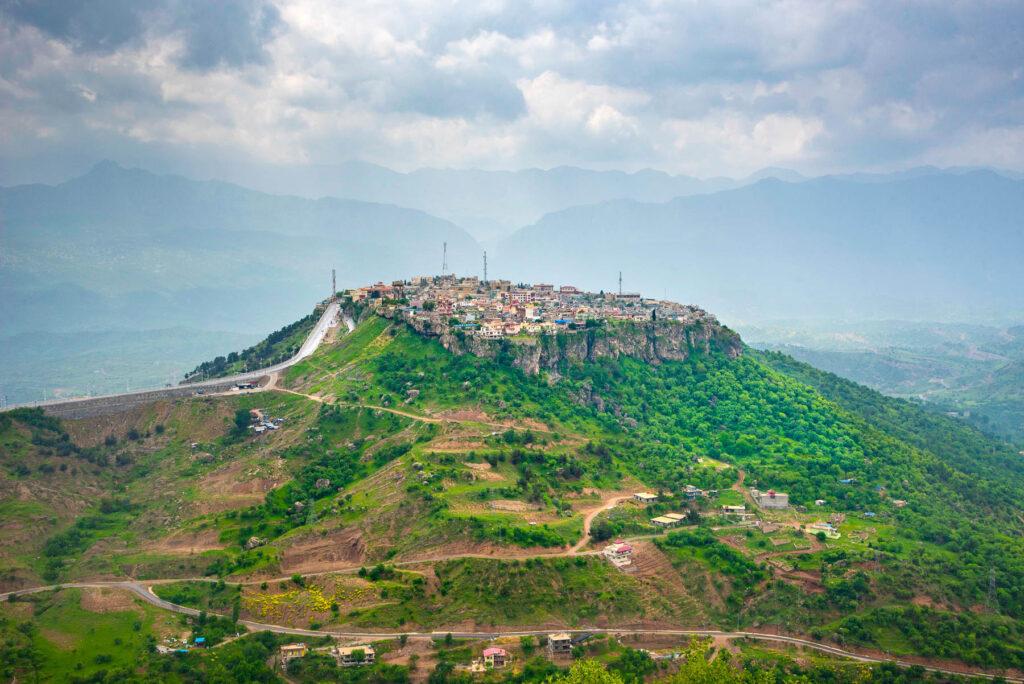
Full Iraq in Spanish
Here’s an extended version of our Iraq tour for Spanish-speaking people. This also includes Kurdistan.
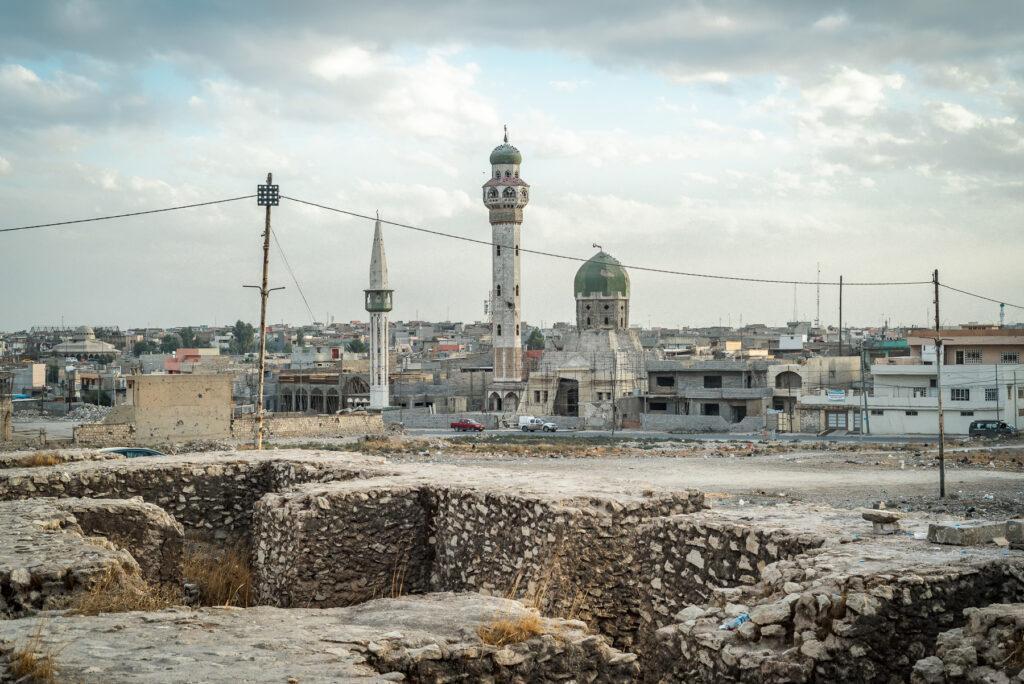
Full Iraq before Ramadan
Our last tour to Iraq before the beginning of Ramadan
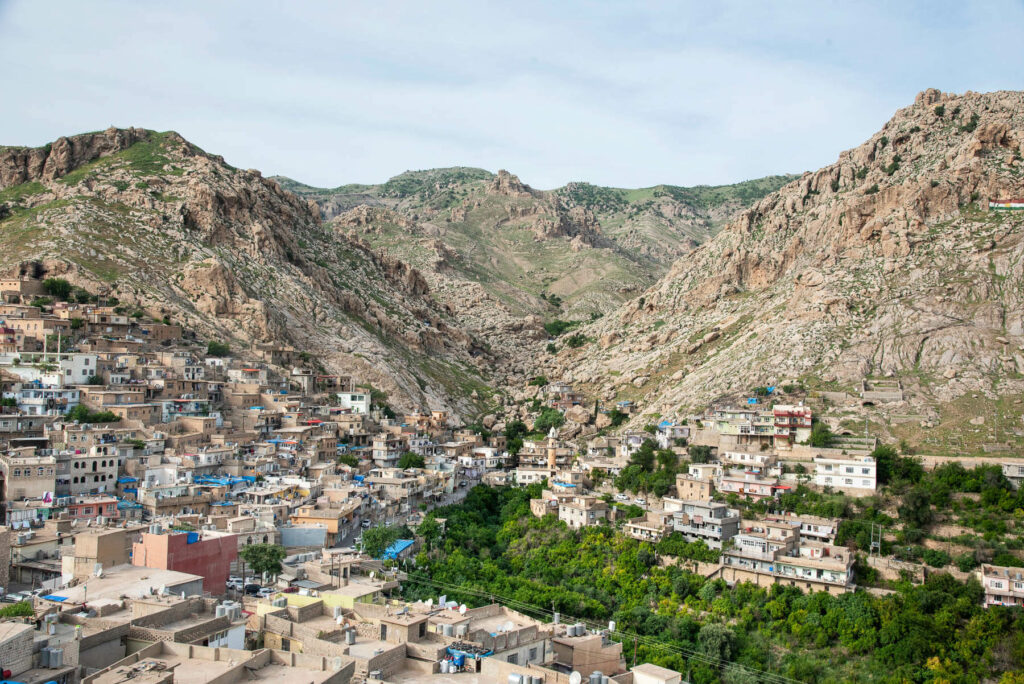
Iraq Kurdistan for Nowruz
Our regular Kurdistan tour during Kurdish New Year celebration
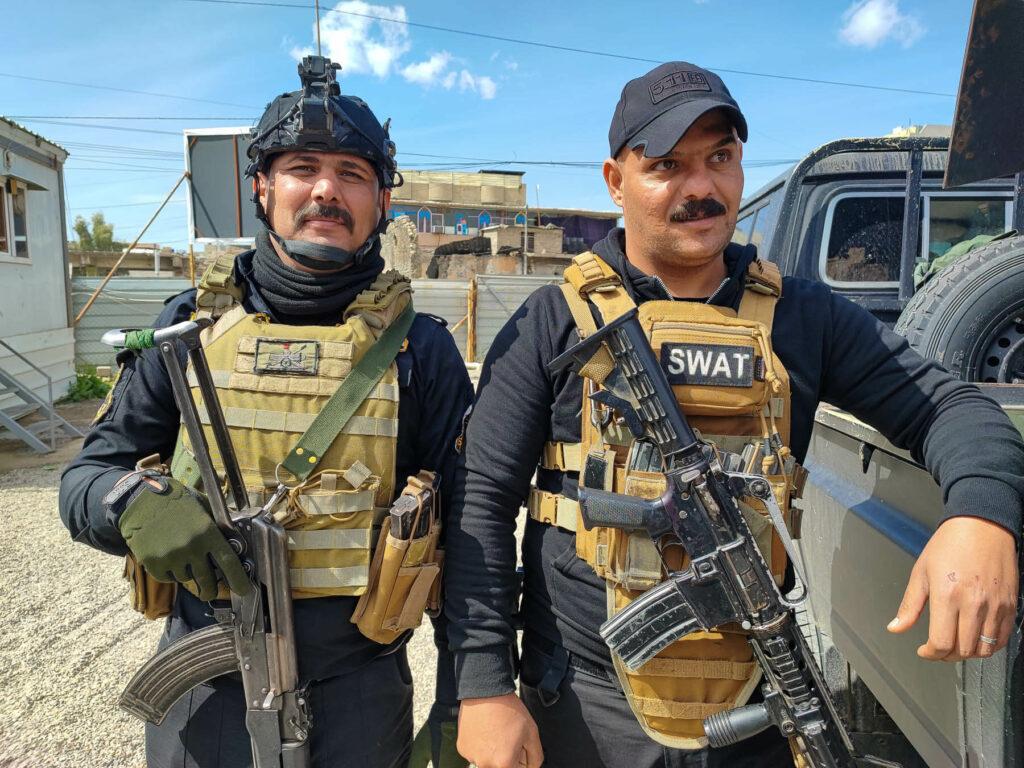
Full Iraq with Fallujah after Ramadan
For the second time, we are adding Fallujah & Basra to our itinerary
All our Federal Iraq Group Tours include
Accommodation
Private transportation and driver around Iraq
Breakfast and lunch
Clearance for all checkpoints
English-speaking Iraq tour guide
Entrance fees to all sites listed in the itinerary
Airport transfer in Baghdad
Fast-track visa service upon arrival in Baghdad
Private, tailored trips for Federal Iraq
Do you want to travel solo, or with a group of friends?
From city tours around Baghdad to compelling multi-day itineraries, we are able to design any sort of adventure based on your needs, 365 days a year, almost anywhere in Iraq.
If you can’t afford a private, solo trip, we can also help you find other partners to travel with.
Tell us your dates
When do you want to travel to Iraq
Which places do you want to visit
We will design the perfect itinerary based on your needs
Where do you want to start from
Erbil or Baghdad?
Sample itinerary for our Iraq tours
Here’s the standard 8-day tour we offer on most of our expeditions.
Day 1 – Arrival in Baghdad
- The first day is a day to take things easy.
- We will be welcoming you throughout the day, picking you up at the airport, and checking in at the hotel.
- Once everybody is settled, in the evening we can all go for a drink or dinner but officially, the sightseeing tour starts on day 2.
- Overnight in Baghdad.
Day 2 – Full day in Baghdad
- The guided tour starts on the second day, a day which we will spend exploring the city of Baghdad.
- We will discover the old book market, the leather and copper bazaars, the historical Shabandar café, and all the old city highlights. We will also visit the Martyr’s Monument and, depending on the political situation, we might also try to get into the Green Zone, let’s see.
- If open, we will also visit the National Museum of Iraq.
- In the evening, we will all go to Dar Al Atraqchi Heritage Cafe, a traditional but pretty modern café and restaurant.
Day 3 – Ancient Babylon and Karbala
- Ancient Babylon was the first great civilization in the world, believed to be the first city to ever reach a population of more than 200,000.
- World wonders such as the Hanging Gardens and the Tower of Babel used to be within these walls.
- Today, Babylon is an archaeological site, featuring a mind-blowing replica of the Ishtar Gate and an actual Lion of Babylon.
- We will also visit the former Saddam Hussein Palace, today overlooking the ancient city of Babylon.
- After lunch, we will head to Karbala, the holiest city in the world for Shia Muslims, a surprisingly touristic city visited every year by, literally, millions and millions of pilgrims.
- We will check out the two jaw-dropping shrines, and spend the night wandering around the lively streets of Karbala.
- Overnight in Karbala.
Day 4 – Karbala & Nasiriya
- There’s so much going on in Karbala that, in the morning, we will take things slowly, wandering around town, checking the places which we probably missed the night before, and then, we will head for Nasiriya, a good 4 to 5-hour drive, with checkpoints included.
- Nasiriya is the largest city in southern Iraq, a high-security city, home to the American-built Al-Hoot prison, a maximum-security prison today filled with ISIS fighters. Nasiriya is also the gateway to The Mesopotamian Marshes.
- Overnight in Nasiriya.
Day 5 – The Mesopotamian Marshes
- This is going to be one of the most exciting days of our trip, since we will head for Chibayish, home to the Arab Marshes, a wetland ecosystem in south Iraq, an aquatic landscape in the middle of the desert, home to a distinct cultural group called the Marsh Arabs.
- We will spend the entire day getting immersed into their culture by visiting their villages, islands and eating masgouf with them, an old Mesopotamian dish consisting of a giant grilled fish.
- In the evening, we will head back to Nasiriyah.
Day 6 – The Ziggurat of Ur and Back to Baghdad
- In the morning, we will visit Ur, one of the oldest cities in the world (3800BC) – even older than Babylon – and believed to be the birthplace of Abraham.
- Then, we will take the long ride to Baghdad.
- In the evening, we can all go for dinner or drinks, and discover the modern part of Baghdad.
Day 7 – Samarra, Hatra and Mosul
- Samarra is a city controlled by a Shia Militia, a city practically impossible to visit for independent travelers but thanks to our expert local guides, hopefully, we won’t run into any issues.
- The city is famous for the spiral minaret of Malwiya, a UNESCO Heritage Site and one of the most famous landmarks in Iraq , absolutely stunning.
- Then, on our way to Mosul, we will stop in Hatra, a very well-preserved ancient Mesopotamian city, located in the middle of nowhere, and also a former ISIS training camp. We will have the chance to see actual ISIS graffiti.
- Overnight in Mosul .
Day 8 – Mosul
- Mosul is the second most important city in Iraq and one of the oldest cities in the world, the place where ancient Nineveh was found.
- In 2017, the city was liberated from ISIS, and people have already started to come back.
- Yes, we will explore the war-torn old city and all its destroyed buildings, but we will also discover Mosul’s most human side by witnessing the reconstruction, getting to know kind-hearted locals, and also checking out all the lively bazaars.
- Overnight in Mosul.
A visa is available on arrival at Baghdad International Airport. It costs 75USD.
This visa is valid for all of Iraq, including Kurdistan.
Which nationalities can join these tours?
Basically, all nationalities which are eligible to the visa on arrival:
All European Union passport holders, and also the United States (yes, Americans can travel to Iraq ), United Kingdom, Russia, China, Japan, South Korea, Canada, Australia, New Zealand, and Switzerland
The situation is getting better and better by the day, plus we will be traveling with a group of local experts who know the latest security updates. Moreover, we will always stick to the stable areas of Iraq.
For more information, check my Iraq safety guide .
How can I get to Iraq?
Both Baghdad and Erbil have an international airport with plenty of connections from Istanbul (Pegasus and Turkish), Doha (Qatar), or Dubai (Emirates).
Are there ATMs in Iraq?
Yes, unlike Iran or Syria, Iraq is not subjected to all those sanctions and some of their banks do accept foreign debit or credit cards.
However, Iraq is a cash economy, so it’s recommended to also bring cash. Both euros and US dollars can be easily exchanged everywhere.
Do you recommend a specific travel insurance?
Either you are joining one of our trips, or you are traveling by yourself, you might want to look for proper travel insurance. Against the Compass has been a partner with IATI for several years already, recommending it to all readers, as well as covering all Joan Torres’ personal trips.
We like it because It covers all the countries where the FCDO advises against all travel, it offers budget plans and covers all sorts of adventure activities.
Against the Compass readers can benefit from a 5% discount .
Get a quote here to claim your discount
Gallery of photos
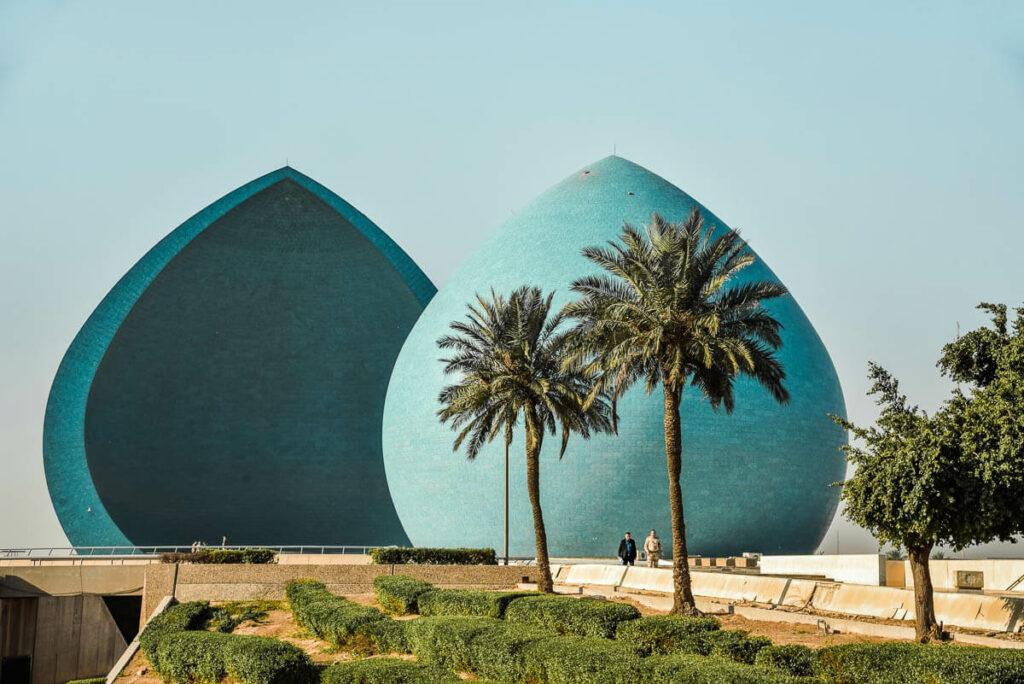
Your message
Get In Touch
Request more info or book a tour.
Fill in the form and we'll get back to you in no time!
- International edition
- Australia edition
- Europe edition
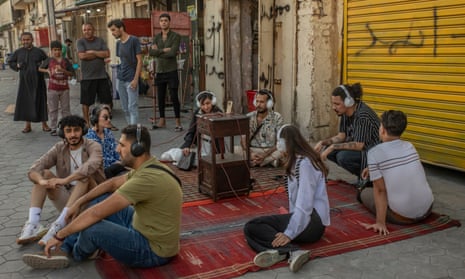
Doing the Baghdad walk: art tour highlights creativity in the heart of Iraq
Annual tour shows war-torn capital is still alive with invention and reflection
A buzz is building in the Bab al-Sharji neighbourhood in central Baghdad where preparations for an annual contemporary arts festival are underway. The city has long been considered one of the most dangerous in the world but artists in the Tarkib collective want to send a different message – that the capital is alive with creativity and culture.
The event, which began when the collective was founded in 2015, comprises the exhibiting of work in public spaces and a narrative tour of the city called Baghdad Walk. Next month’s four-day Tarkib contemporary arts festival is titled Hello Future!
Zeid Saad plans to show an installation about cluster bombs, which, while banned by more than 120 countries, are still used in conflicts today. When he was a child, they were used in Iraq and he still remembers how the shape was attractive to children. “The unexploded cluster bombs on Iraqi soil still kill children because when they see them they think they can play with them. I will exhibit a real size iron bomb in red colour – the blood colour – but the shape of the core of the bomb will be a balloon, representing children and their dreams,” he says.
This piece will be accompanied by video art from an Iranian female artist on the same topic. More than half of the artists, who have been working for months on their pieces, are women who find in Tarkib a platform for freedom of expression.
Members of Tarkib come from a variety of fields including the visual arts, performing arts, music, literature, film, interior design, architecture, graphic design, and photography. A different location is chosen every year for Baghdad Walk, to tell stories of the city from the artists’ perspective.
For their 10th anniversary, Tarkib are revisiting the area where they staged their first festival, as well as showing exhibits at Baghdad’s Museum of Modern Art , which opened in 1962 and was a symbol of the emergent modern Iraqi art at that time.
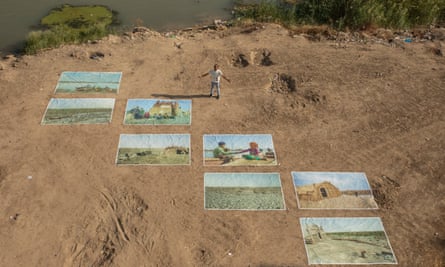
“In these [10] years we’ve crossed the famous Rasheed Streets, the family-friendly Zuwara Park, Abu Nawas Street next to the river Tigris and each time it feels like we’re giving a new meaning to the places we collectively step into,” Saad says.
For last year’s Baghdad Walk, Ateef al-Jaffal put on a sound archive exhibition at the Iraqi National Museum square. The square is often crowded and the museum with its collection of ancient Mesopotamian relicsis the pride of the Iraqi people. I joined a group of youths at al-Jaffal’s event last October, who were sitting on a carpet around a small traditional wooden table. We put on headphones that branched out from the table like the tentacles of a jellyfish. When Ateef pushed the play button, the atmosphere changed. Some youths held back tears, while others gazed at the ground, listening carefully.
“My series called Khezama is a sound archive artistic work, collecting Iraqi music played in mortuaries from 1941 to 2020,” the 23-year-old artist explained. “There are two kinds of music: Arabic, Kurdish, some Christian war songs; and sound tracks from different countries, like Iran and Palestine.”

Iraqi society has been shattered by decades of dictatorship, war, sanctions, occupation and a revolution, and many were emotionally affected by Ateef’s sound collection. The people of the “country of the two rivers” – a reference to Iraq’s two rivers, the Tigris and Euphrates – have struggled to overcome the often ongoing traumas of this history and shape new collective narratives. “We usually use the table to put chai [tea] on for guests, we sit around it and have a conversation. But we stopped talking about martyrs. The concept behind the small table in the exhibition is that every Iraqi has a martyr but the tables are talking about it more than humans.”
after newsletter promotion
As the heavy memories inherited by their parents or lived by these young students and emerging artists weigh on them, this new generation is trying to re-tell the history of Baghdad and raise its voice against government corruption and foreign interventions that continue to affect them.
The day after Ateef’s exhibition, Baghdad Walk moved to the Sarafiya Bridge. In the 1970s the bridge was crossed by a railway train, which had already ceased to operate when the US bombed the bridge in the 1990s. “At the time, the economic situation in Iraq was very hard because of the sanctions,” says Saad, looking at the Tigris river from thebridge. “The bridge was rebuilt with the iron of the railway.” Under the bridge the award-winning photographer Haider Hamid exhibited his pictures of a long-term project about climate change, portraying people in the Iraqi marshes where drought is progressively impacting the whole eco-system of one of the oldest agricultural areas of the Greater Mesopotamia. Also called the “bridge of the lovers”, as the place where students flirt , it was again destroyed in 2007 by a car bomb explosion and rebuilt .

As Ateef’s sound-archive drew to a close , other music and voices prevailed and the listeners seemed to feel relieved. “It’s the sound of the revolution” says Dina, 23, who recently graduated from the faculty of architecture. “We lived it and it changed our community a lot, not from the political or the government side, but the revolution was the only different thing in the past 40 years. It’s our revolution.”
Dina is referring to the October 2019 protest movement that started in Baghdadand spread to other provinces , prompting millions to fill the streetsto express their anger at corruption, high unemployment and dire public services. The government reacted violently , killing around 500 people and injuring thousands more.
“It’s a weird idea but, as opposed to wars, the revolution seemed like the only good reason to die, in a way,” concluded Ateef. “It was for the future of all of us.”
- Middle East and north Africa
Most viewed

IMAGES
VIDEO
COMMENTS
Travel to Babylon. The ruins of Babylon are located 88km south of the Iraqi capital, Baghdad. Our tours to Iraq begin in either Baghdad or Najaf, both of which have well connected airports. Access to Babylon was reopened to tourists in 2009 but so far few foreign tourists have made the journey.
To visit Babylon, which lies along the famous Euphrates River, you first have to go to Hillah city, 120 km south of . From Hillah, you can get a short ride (20 minutes) to reach the heritage site of Babylon. From Babylon: If you only visit the Babylon ruins, you can easily do it on a day trip from Baghdad.
The Babylon ruins, once the capital of Nebuchadnezzar's empire, are among many archaeological sites in Iraq bearing witness to some of the world's oldest and most magnificent cities. Named a ...
Modern-day Babylon's location is in the southern part of the country, around 95 km (59 miles) south of Iraq's capital - Baghdad. It runs along the Euphrates river and 49 km east of the holy city of Karbala. The closest city to Babylon is the city of Hillah, the capital of the province. Hillah itself was once a major center of Islamic ...
I leave Iraq's capital, Baghdad, and head south to visit Babylon - the largest city of the ancient world. It is now overlooked by an abandoned palace belongi...
Babylon, Iraq: Ultimate Travel Guide. Author david. Date October 28th, 2023. Welcome to the ancient city of Babylon, Iraq! Located roughly 50 miles south of Baghdad in present-day Iraq, Babylon holds a significant place in history. With a legacy dating back to the 18th century BCE, Babylon was once the capital of the mighty Babylonian Empire ...
I went to my uncle's house, which lies about a quarter of an hour from the ancient city of Babylon. The ancient city lies within the modern-day city of Hillah, the center of Babel Governorate, Iraq, about 83 kilometers south of Baghdad, the Iraqi capital city. After the US-led invasion in 2003 CE, the American and Polish armies established a ...
With a visit to the elegant Ishtar gate and the popular Lion of Babylon, this virtual tour will provide insight into the unique threats to Babylon's heritage and WMF's 12-year project to address them. ... Babylon, Iraq. WMF has been working with Iraq's State Board of Antiquities and Heritage since 2008 to conserve Babylon's fragile ...
Full Iraq before Ramadan. This is the most complete expedition into Iraq, where you'll travel from southern Iraq to the Kurdish lands in 11 days, visiting highlights like the Mesopotamian Marshes, Karbala, Babylon, Baghdad, Mosul, Lalish, Erbil and more. From visiting the center of Yazidism to the holiest place for Shia devotees, while ...
BABYLON, Iraq — On a mild winter weekend, the sun pours down on the yellow archways of the reconstructed palace of King Nebuchadnezzar II at the site of the ancient city of Babylon. Nearly three millennia after Nebuchadnezzar's reign, visitors from a tour group cluster to admire a brick frieze depicting strange creatures that look like lions ...
Iraq's historic site of Babylon is famous worldwide, but some Iraqis are just getting to know it again — thanks to tours that introduce them to the past.
5 days tour - Baghdad, Babylon, Karbala & Samarra. Visit the cradle of civilisation: the land between the Euphrates and the Tigris has one of the richest histories in the world. During this four-day tour you will get to know the different sides of it. You will visit modern and ancient Baghdad, the holy city of Karbala and the historical sites ...
06/10/2024 - 20/10/2024. 24/11/2024 - 08/12/2024. 4590 £ Per Person. It is possible to shorten the tour to two options. South Iraq 9 days from Basra to Mosul. Iraqi Kurdistan 9 days start and end in the city of Erbil. If you are interested, please contact the office to arrange the route and the price of the trip.
Our Iraq tours departing from Baghdad offer the opportunity to immerse yourself in the rich history and culture of the fascinating Babylon ancient city. Images of the Ancient city of Babylon in Iraq Babylon " The Babylonian Empire was the most powerful state in the ancient world after the fall of the Assyrian empire (612 BCE).
Baghdad tour - See the Liberation Square monument, which commemorates the establishment of the Republic of Iraq. Visit to the National Museum of Iraq. Reopened in 2015 after notorious looting during the war, it contains various treasure from the Mesopotamian and Babylonian periods. Visit the incredible and well renovated Al-Mustansariya School.
US$7,995. Explore the mysteries of Iraq on an exclusive 15-days, 14-nights tour in Oct 2024 hosted by Ancient Origins' Dr Micki Pistorius. Everyone booked on this tour will receive a booklet with articles by experts to the archaeological sites to be visited in Iraq. Dr Micki Pistorius' journalist career commenced in printed and television media.
Discover Iraq's enchanting wonders with our tour operator. Choose between private tours for a personalized experience or join our group excursions to connect with fellow travelers. We assist with Iraq and Kurdistan visas, offer hotel bookings, and provide reliable airport pick-up and drop-off services. Our dedicated team ensures a seamless and ...
Join a group of like-minded travelers in our next scheduled tour in Iraq, where we'll visit Baghdad, Babylon, Karbala, Mosul, and more May 19th to 26th, 2024 - APPLY NOW For most people, Iraq is perceived as a challenging country to travel to, a destination only aimed at experienced backpackers, the reason why most travelers tend to visit ...
Hi Friends, I have taken Video on 06/01/2021 in Babylon City, Hillah, Iraq.Location: 32°32′11″N 44°25′15″ELet's catch up? Follow me on Social media mentione...
Upcoming Iraq Tours. These are all our upcoming tours to Iraq (including Kurdistan region) Federal Iraq classic itinerary. From Mesopotamian Marshes to Karbala, Babylon, Baghdad and Mosul, this is one of the most sought tours we offer. May 19-26, 2024.
The event, which began when the collective was founded in 2015, comprises the exhibiting of work in public spaces and a narrative tour of the city called Baghdad Walk. Next month's four-day ...